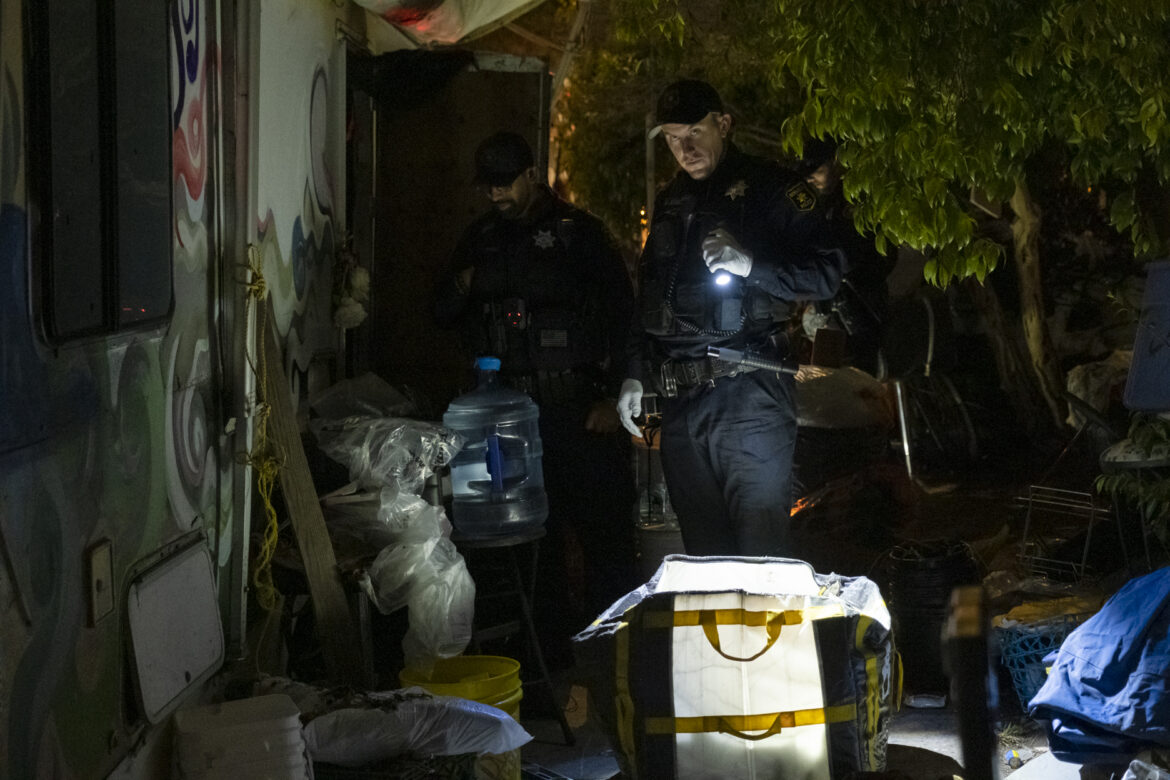In early October, Berkeley police and city officials roused 53 unhoused residents — claiming they were harboring rodents — and seized and destroyed 29 tents and three self-made structures. People begged to retrieve personal items and work tools before the property was tossed into a phalanx of garbage trucks. Four vehicles in which people had been living were towed to impound lots. They would be crushed 15 days later, per the city’s request.
While some operable cars and RVs were allowed to remain in the neighborhood, and people without vehicles who chose to stay were offered two-person tents, the overall effect of the sweep was that dozens of unhoused people had their belongings taken and their daily existence turned upside down.
Two camp residents ended up in the hospital, and one in jail for three days. Many people experienced panic attacks, and fire department paramedics came to check on Alice Barbee, who was suffering from heart palpitations. But she refused to go to the hospital because she was worried about losing her tent and belongings. Barbee stayed to fight but still lost most of her things — and ended up in the hospital the next day because anxiety exacerbated her high blood pressure and asthma.
I know what happened that day, because I was there. Since 2017, I have lived in my RV. I have parked in a few locations around the city, searching for safe parking. I do my best to be a good neighbor by keeping garbage in trash cans, and keeping the sidewalk clear for pedestrians.
I am part of a community of people who, for various reasons, have been evicted from their prior camping areas around the city and along the I-80 freeway exits in Berkeley. City staff call our make-shift encampment the “Harrison Corridor.” Some newer residents are physically and mentally disabled, and others struggle with substance use and mental illness.
Jump to Yesica Prado’s photo essay and detailed narrative of the Oct. 4 encampment sweep at Harrison and Eighth streets in Berkeley.
HOW WE GOT HERE
I have lived at Eighth and Harrison, since 2018 when the vehicle community I was living with was displaced from the Berkeley Marina. We parked together for safety, and we supported each other with mutual aid and chores, which was especially critical during the pandemic. We were welcoming to people who pitched tents; they needed a safe place to sleep and keep their belongings, too.
We talked regularly with some of our commercial neighbors so we wouldn’t disrupt their activities. Urban Amadah, a nonprofit community farm, has been generous, sharing free food through a dry pantry and a community fridge where we can store perishables. Other businesses in the Gilman District have provided us with plastic bags and trash bins.
In October 2021, our numbers dwindled to about 13 vehicle homes from 54, after the city opened its first safe parking lot program and offered a place to park off-street. The program wouldn’t lead to housing, but it would provide minimal amenities like a water tank, portable toilets, a strip cord for a charging station and a dumpster. Various nonprofits were already providing these basic amenities and food to us at Eighth and Harrison, where we also had plenty of choices for affordable meals.
Many RV residents agreed to move to Berkeley’s sanctioned parking lot. Some motorhomes were inoperable, and they were likely to get ticketed if they remained in the area once the city launched a four-hour parking pilot program to reduce the number of vehicles parked in the Gilman District. I had lived at this intersection for years — some of my neighbors had lived there for as long as a decade. We shuffled our parking spaces to comply with the long standing 72-hour parking ordinance.
There were not enough parking spaces for every vehicle resident in the city’s sanctioned parking lot, and it was not feasible to some people due to vehicle size and family restrictions. So, some of my neighbors and I stayed together for safety where we were as the city began issuing more citations.
When alternatives are not available, the city uses parking enforcement to keep people moving and satisfy complaints.
“This annoyance can be enough to send a message that people are watching and not appreciating what’s going on,” Beth Garstein, legal aide to Councilwoman Rashi Kaserwani, wrote to a constituent in an email. “Please feel free to share the phone number and have people call as many times as it takes to get parking enforcement involved, and involved frequently.”
I can drive my RV, but not very far due to mechanical issues, and there are not many places in Berkeley where I can park for more than a few hours at a time. West Berkeley has been an easier place to park because it’s a light industrial area with few residences. But there is a lot of construction on this side of the city these days, so there are fewer parking spots available. Many people had been displaced already from encampments on Second Street, at Aquatic Park and in the Grayson Street area to make way for a new road, a temporary shelter and a research and development center.
In February, the city made another attempt to move everyone away from Eighth and Harrison streets. People living in tents were offered 28-day hotel vouchers to stay at the Berkeley Inn. When the program ended, they found themselves back on the streets.
After those people returned, the city decided that it “would de-prioritize the encampment for closure IF the residents could meet basic standards for neighborliness,” city spokesperson Matthai Chakko wrote in a recent email to me explaining how the city had responded to the encampment over time.
HOW TRASH BECOMES A PROBLEM
We had managed the trash in our neighborhood effectively until everyone started sheltering in place during the pandemic. Parking enforcement ceased, so most of us stopped moving our vehicles, and things started piling up on the sidewalk. Some camp residents took this time to repair their vehicles and build house structures.
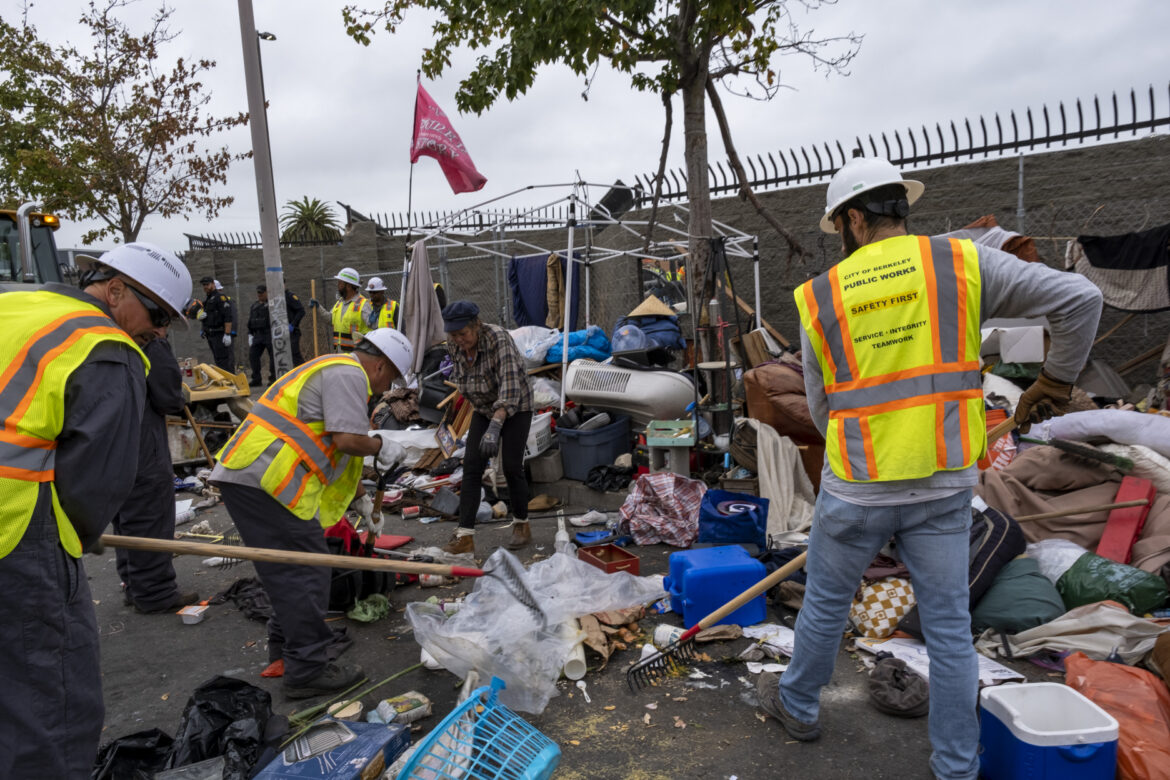
Yesica Prado / San Francisco Public Press
Residents of a Berkeley encampment try to grab what they deem essential — clothing, personal effects and the tools of daily living — while city staff dismantle and haul away the collection of makeshift homes and their contents.In late 2020, Shallon Allen, former supervisor of the Homeless Response Team, approached us about trash accumulation and asked camp residents to pile trash at the corner of Eighth and Harrison streets, next to the Berkeley Repertory warehouse. The pile attracted rodents and illegal dumping by people not associated with our camp.
We asked for help with a dumpster and individual trash cans assigned to each of our households. But it took the city nearly two years to place the dumpster. By then, the rodent problem was out of control.
Now, garbage pickups are scheduled nearly once a week, but the dumpster often overflows. Illegal dumpers fill it with furniture, and businesses also use it to discard tree clippings and bulky trash. The overflow is left on the ground as the city does not pay for this extra service. Without consistent sanitation services, the conditions at the encampment have persistently deteriorated, “warranting this summary nuisance abatement,” Chakko wrote in his email to me.
ORCHESTRATING A SWEEP
The Oct. 4 sweep operation was organized by Assistant to the City Manager Peter Radu, lead supervisor of the Homeless Response Team. On Sept. 26, Radu submitted an internal report to his boss, Dee-Williams Ridley. The 40-page memo outlined reasons for authorizing a deep cleaning at a long-standing encampment at Eighth and Harrison streets. The report focused on violations of four municipal codes, all dealing with one issue: what the city calls rodent harborage conditions.
Four days later, Radu posted copies of a public notice around the neighborhood. In bold letters, it read: “Notice of Imminent Health Hazard and Emergency Abatement Beginning October 3.”
That day he came to post notices. Through my windshield, I could see and hear Radu speaking with my next door neighbor, Dante, who had been sick all night vomiting. He looked ill and exhausted. Radu handed him a copy and told him to clean up his area or his motorhome would be at risk of towing. With low energy, Dante reassured him.
Next, it was my turn. Radu approached my motorhome and stood outside. He didn’t knock or call my name — he knows who I am — but I could hear the sound of masking tape. I opened the screen door.
Radu raised his stack of paper, and said, “We are doing a deep cleaning.” He pointed at the paper notice he had taped to my kitchen window and raised his phone to his chest height, taking a photo of me and the notice. I smiled for the camera.
The notice was posted on a Friday afternoon. People cleaned up through the weekend and made piles of items on the road for the upcoming deep cleaning. I shared plastic bags with my neighbors.
Monday came and went — and no one from the city showed up. We were not surprised. We had no idea when the trucks would appear.
We had seen notices like this one before — a similar one had been issued to residents in the camp on June 30 and July 28. Although personal property was discarded and items on the roadway were removed, shelters were not destroyed.
But I noticed two new lines on this public notice: “Vehicles may be subject to tow and impound if authorized by the Vehicle Code and caretaking needs.” There was no vehicle code section listed nor any explanation of “caretaking needs,” which was not a phrase I had ever seen the city use. Nothing in the notice indicated that we were being asked to leave.
The notice stated that people in our area had created a public nuisance and violated Berkeley municipal codes concerning rodent harborage. It also said we were in violation of various ordinances against blocking sidewalks.
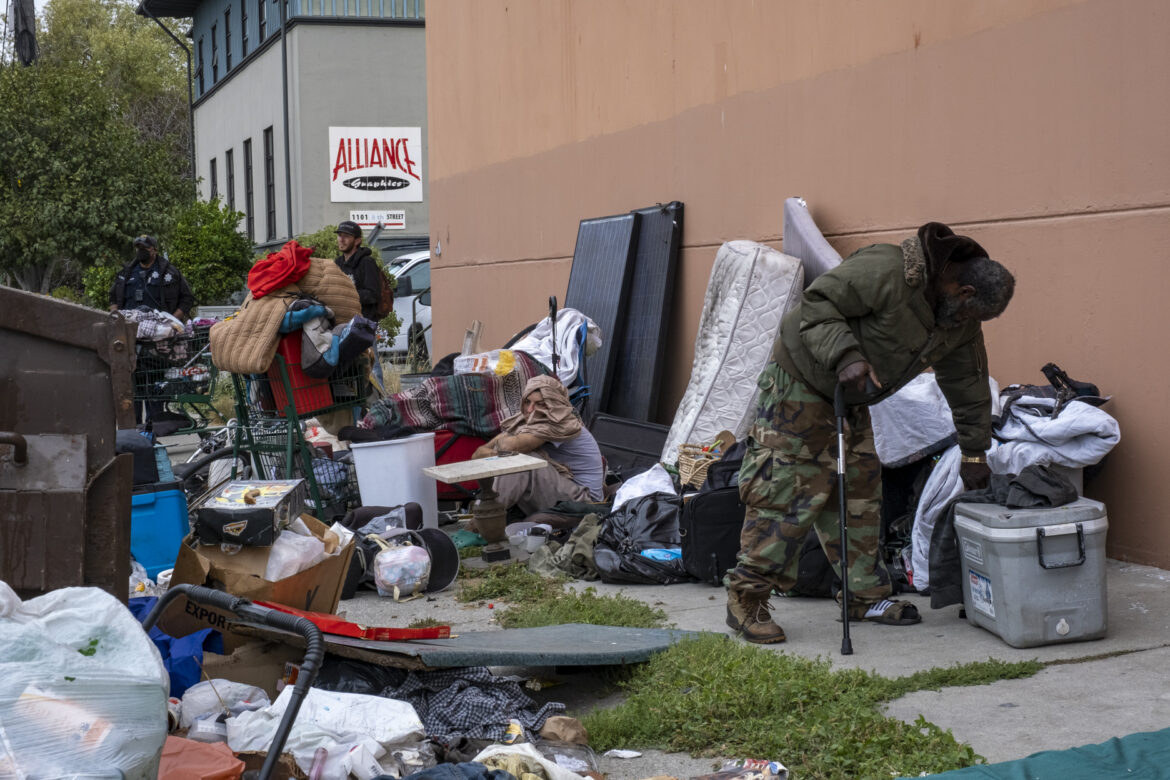
Yesica Prado / San Francisco Public Press
People who sleep in tents or vehicles try to salvage what they can after the city of Berkeley ordered a “deep cleaning” of the blocks where they lived near Eighth and Harrison streets.“This was the most intensive intervention option the Berkeley Municipal Code affords us,” Radu wrote to a Gilman District business in an email a week after the Oct. 4 sweep. “But you can see that our codes were not designed to contemplate this kind of situation.” Another abatement is not possible without building up another case, “which ironically requires that the conditions deteriorate sufficiently.”
City staff encourages business owners to call the police, which helps them build a case for the abatement of encampments.
“If you or your staff are ever threatened, please do call BPD right away and they will prioritize accordingly,” Radu wrote to a business owner in an email. “It helps them to receive these calls for service and helps us build a record/case for moving towards enforcement.”
Radu also shared his reasons with homeless advocates and wrote in an email: “As I look at it, unsheltered homelessness is the new normal (as unacceptable as that is, it is true), which means it is incumbent upon all of us (government and the community together) to devise a new social contract that recognizes and creates rules around this new normal.”
THE ABUSE IN SWEEPS
I understand that some Berkeley residents might think sweeping encampments is necessary. But what happened in October when the city cleaned the streets where we lived — offering vague warnings, unclear instructions for compliance and meager assistance — was unnecessarily disruptive, cruel and inhumane, my neighbors said.
“When you consistently lose your stuff in this manner, you begin to lose your mind,” said Eren, a camp resident. “All the stuff that reminds you of yourself and all your memories are lost. Everything is gone, and you become more lost.”
The uncertainty about when and how this might happen is unsettling and leaves residents feeling that they don’t have control over their daily circumstances. Fear and anxiety crawl up on you — even in your sleep.
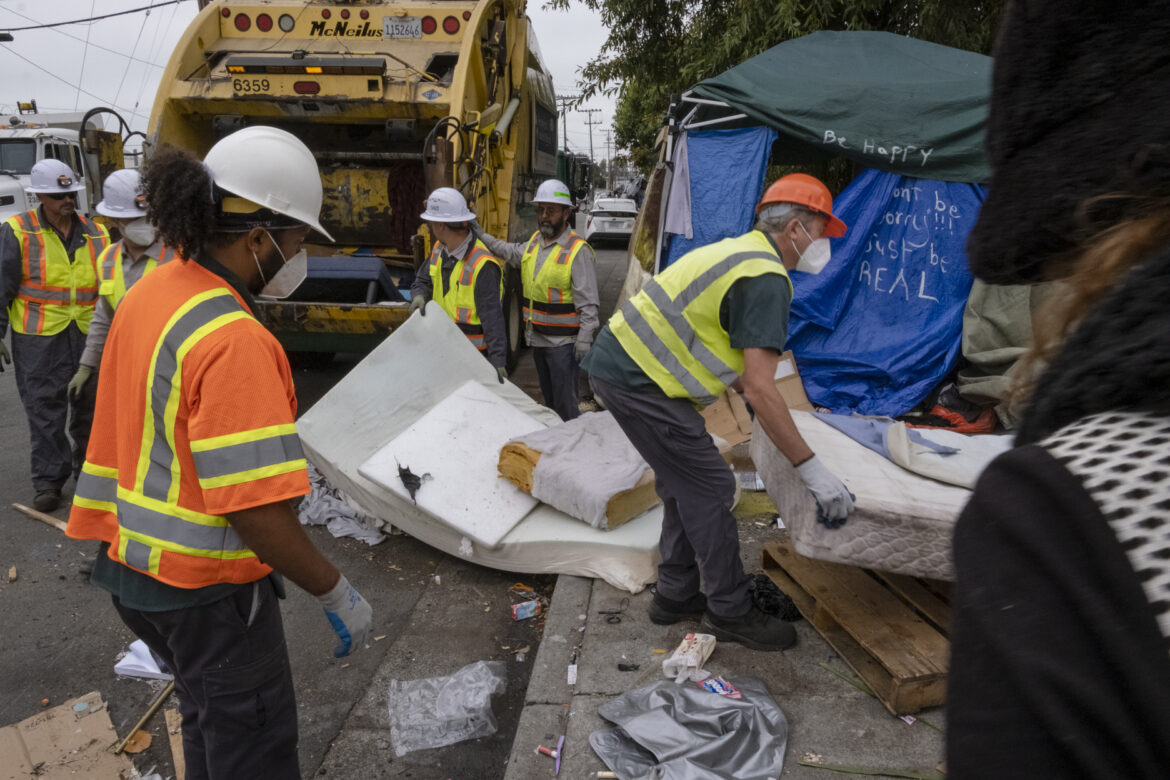
Yesica Prado / San Francisco Public Press
Jennifer tries to pack up her belongings, but staff from Berkeley’s Public Works department throw them away, picking up everything in their path. Workers dismantle Jennifer’s bed and toss it into the garbage truck.People who lack housing have a hard time adhering to these ordinances. If a person lies down in public to rest, they are breaking the sidewalk ordinance against occupying more than 9 square feet.
“We’re trying to work within the spirit of our sidewalk policy. There’s not a tent out there that is three by three,” describing the dimensions in feet technically allowed, said Radu, the day of the abatement. “We’re going to allow them because they have nowhere else to go to have a slightly bigger tent, but we got to maintain some respect for sidewalk policies.”
The morning after the encampment sweep, city workers came while residents were still sleeping, and everything outside people’s tents was thrown into the garbage truck again, including working bikes, wagons, scooters and pet supplies.
“If you want to remain unsheltered, you are going to have to play by our rules,” Radu said to a camp resident who was asking for his property back.
Many people wonder why unhoused residents would decline the city’s offers for services and persist living on the street. The truth is, the offers of shelter are often temporary and less attractive than living in an RV or a tent. Privacy is key. And there are not even enough shelter beds or hotel rooms in Berkeley to offer people to prevent encampments from reappearing.
The city offered some of my neighbors spots in the Old City Hall emergency winter shelter, which is usually open only six months a year, and will close in April. It is a congregate shelter with 19 beds, as COVID-19 restrictions slashed capacity in half. Another alternative was a room for five days at the Berkeley Inn motel, but that option wasn’t offered to everyone, and only one couple stayed there.
“So, obviously more people than beds, which is why we’re not asking everyone to leave,” Radu said during the abatement.
But short-term solutions eventually expire. As Berkeleyside recently reported, the safe parking lot is closing on Dec. 31, and every RV parked there will be returning to the streets. As of this week, there are no shelter spaces available in Berkeley or Alameda County.
The abatement operation didn’t improve much for people living at the encampment or for nearby businesses. Camp residents lost valuable and irreplaceable belongings like their medication, family heirlooms and personal paperwork. Business owners expressed their frustrations, again. “The campers are returning and spreading out. I have not seen any police presence this week or end of last week to enforce the Public Notice,” wrote Mark Morrisette, facilities director of the Berkeley Repertory Theatre, in an email to Radu a week after the Oct. 4 sweep.
In response, Radu in several emails has directed business owners to Alameda County to request “substance abuse resources and permanent housing resources to address the people living at this encampment.”
Residents who live outside, in tents or in vehicles are at the mercy of city administrators, who might decide at any time that they need to downsize their footprint or be moved. That’s what happened in the Gilman District on Tuesday, Oct. 4.
Here’s how that chaotic day unfolded.
PART ONE: AN AMBUSH
6:20 a.m. I wake up to the sound of heavy machinery. But it isn’t the forklift at the construction company next door or a tow truck unloading Teslas for repair. I open my eyes, and on the ceiling I see blue and red lights. I quickly jump out of bed.
When I open my door, I see two Berkeley police officers, Kacalek and Pickett, standing by the cabin of my vehicle overseeing the seizure of my neighbor’s possessions. Two more officers, Valle and Johnson, stand behind them. Dante is not allowed inside his vehicle. I ask to help him, but they will not allow me to pass.
So I go on the other side of my RV, and that’s when I see the size of this operation. There are dozens of people: cops, city staff and workers in orange vests, walking up and down Harrison Street — it is nothing like I have ever seen before. The streets that lead to our intersection are closed. The Tesla mechanics watch from the sidelines, some filming with their phones.
6:40 a.m. Staff from the Department of Public Works are going after Clarence Galtney’s massive recycling bags. Galtney has lived in an RV in the neighborhood since 2019. He earns money collecting bottles and cans around Berkeley, which he redeems for cash. One, two, three, four, five bulging bags, each one nearly five feet across and just as tall, are tossed into the garbage truck parked across from his home. They fill a whole truck with Galtney’s recycling. Weeks and weeks of work go straight into the trash.
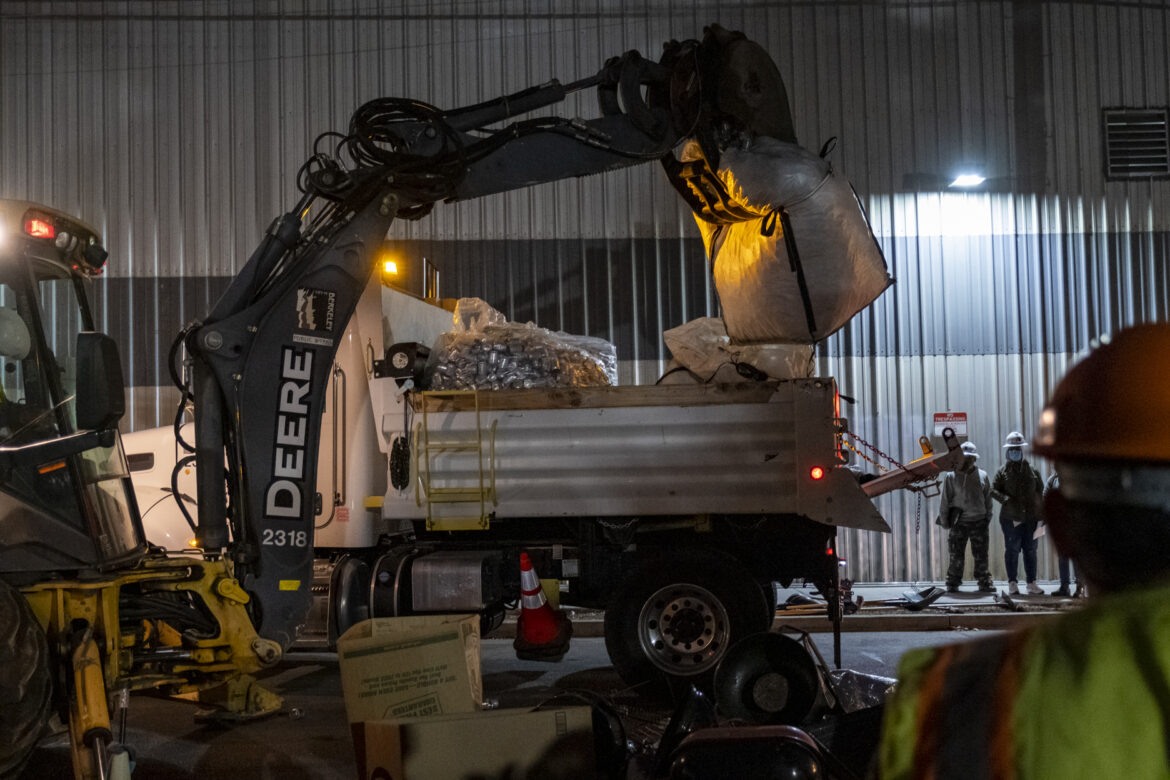
Yesica Prado / San Francisco Public Press
Outreach workers Eve Ahmed, Tony Alcutt and Okeya Vance stand on the sidelines, watching from across the street. All of Galtney’s belongings — tool boxes, wagons, grocery carts, barbecues, cookware, shoes, bags of clothes and kitchen appliances — are being thrown into the middle of the street to be scooped up with a backhoe.
6:43 a.m. I return to my RV to see what is happening with Dante, and find Peter Radu standing on the roof of Dante’s RV sweeping everything that he had stored up there to the ground. Below, public works employees pick up the now-broken items, pieces of plastic and shattered glass sprayed across the pavement.
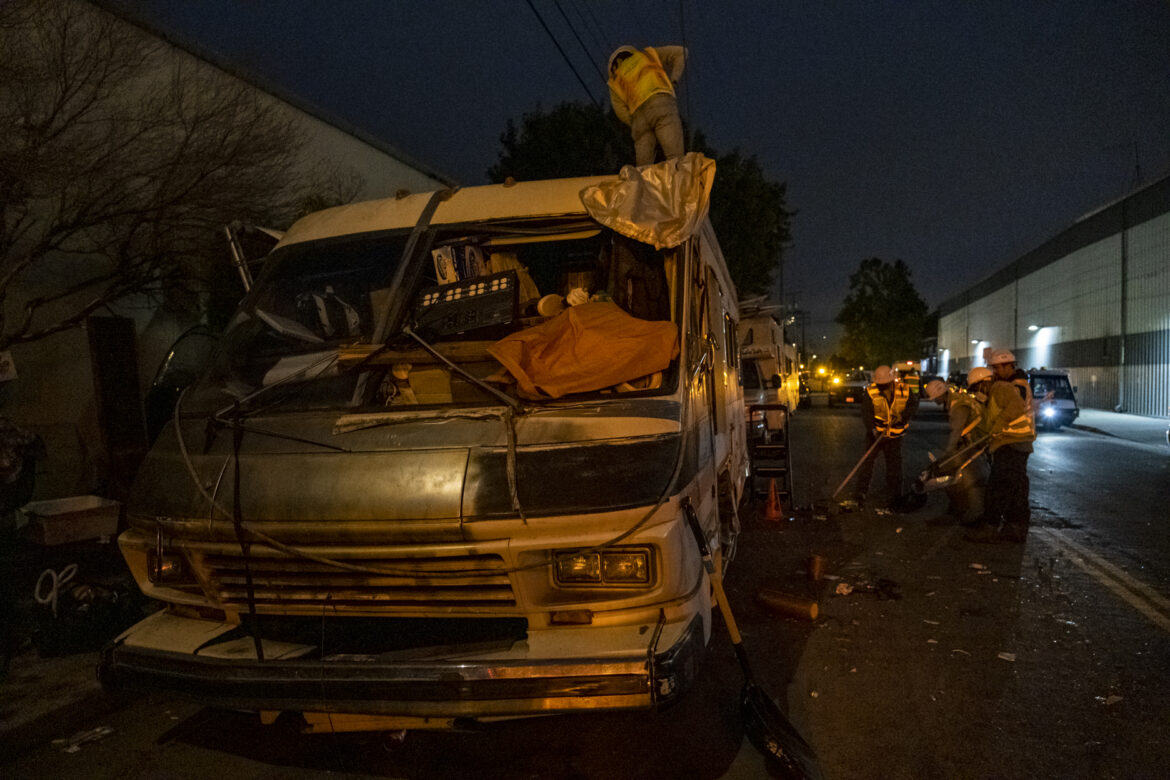
Yesica Prado / San Francisco Public Press
Five public works employees and seven police officers surround Dante’s RV to clear his property around his vehicle. They bring in a crane to scoop it up.
6:47 a.m. Dante packs any essentials he can find outside his home. He starts with tools he uses for his work as a handyman. Dante’s breakfast is still on the stove, grilled onions sizzling in the pan. He was about to put them on his morning burgers when officers surrounded his vehicle home.
6:49 a.m. Public Works employees take Dante’s recycling bags, which he had just sorted out into cans and plastics, the night before. Next, they take his clothing and supplies for his dog, Cookie. Everything is crushed by the garbage compactor.
7 a.m. A parking enforcement officer arrives to start issuing tickets.
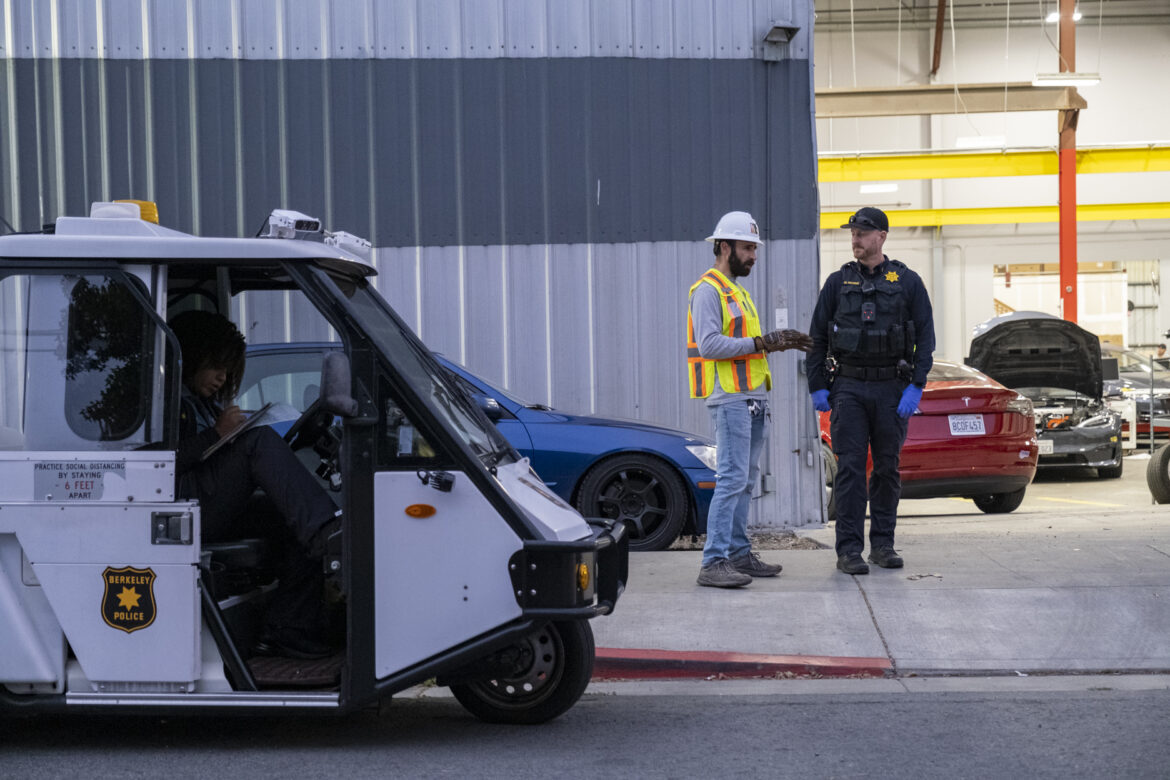
Yesica Prado / San Francisco Public Press
7:15 a.m. Eight public works employees finish consolidating all of Galtney’s items in the roadway. The backhoe’s scooper scrapes the pavement as it takes the last pile.
7:18 a.m. An officer stands blocking Dante’s door. More public works employees pick up plastic containers that he had just packed with his dishes and bicycle parts he was trying to keep.
The garbage truck is parked right in front of Dante’s home. He now notices all his possessions in the truck, and pulls back his shower tent from the scooper. Essential items all thrown out: car batteries, tools, carts, wagons, water containers, clothes and the pressure washer that he uses for work.
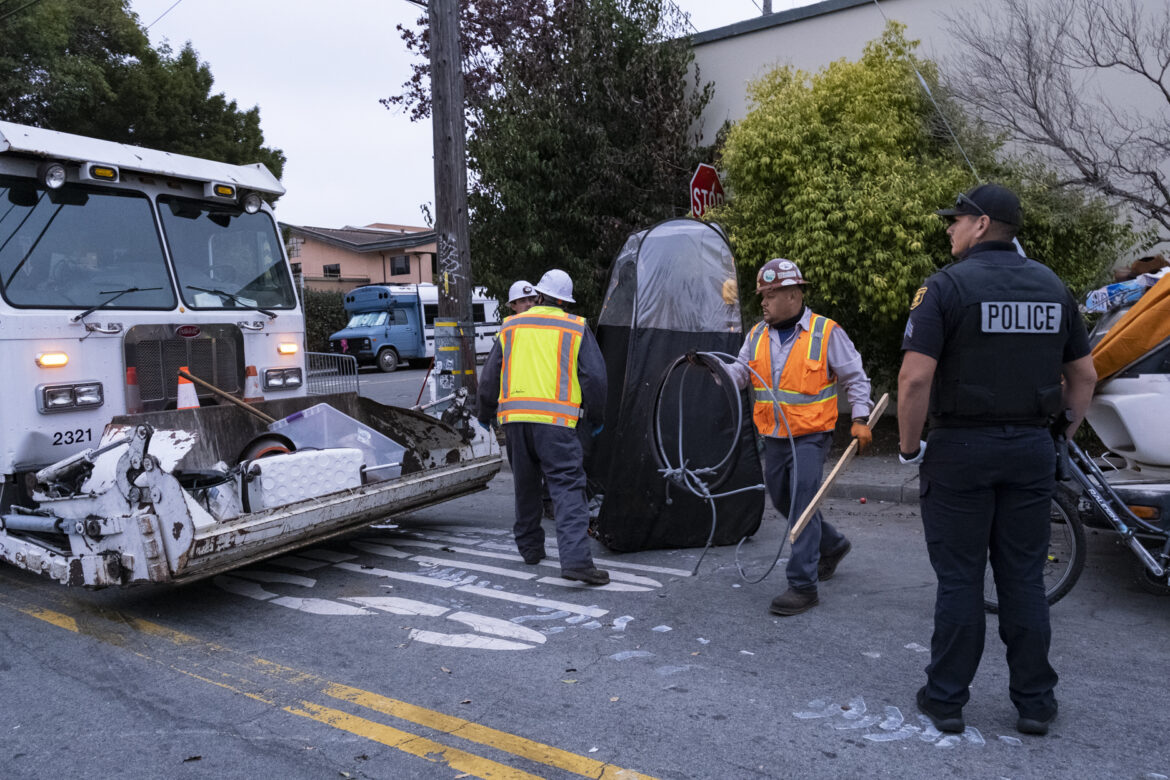
Yesica Prado / San Francisco Public Press
7:25 a.m. Time is running out for Dante. Radu tells him that his RV is about to get towed. Radu won’t let Dante back inside, but says he can get a few items out of his vehicle for him. Dante asks Radu for his wallet and phone to begin with, but Radu cannot find either of them, and he won’t let Dante keep his mom’s flat cooktop, which is plugged into a propane tank.
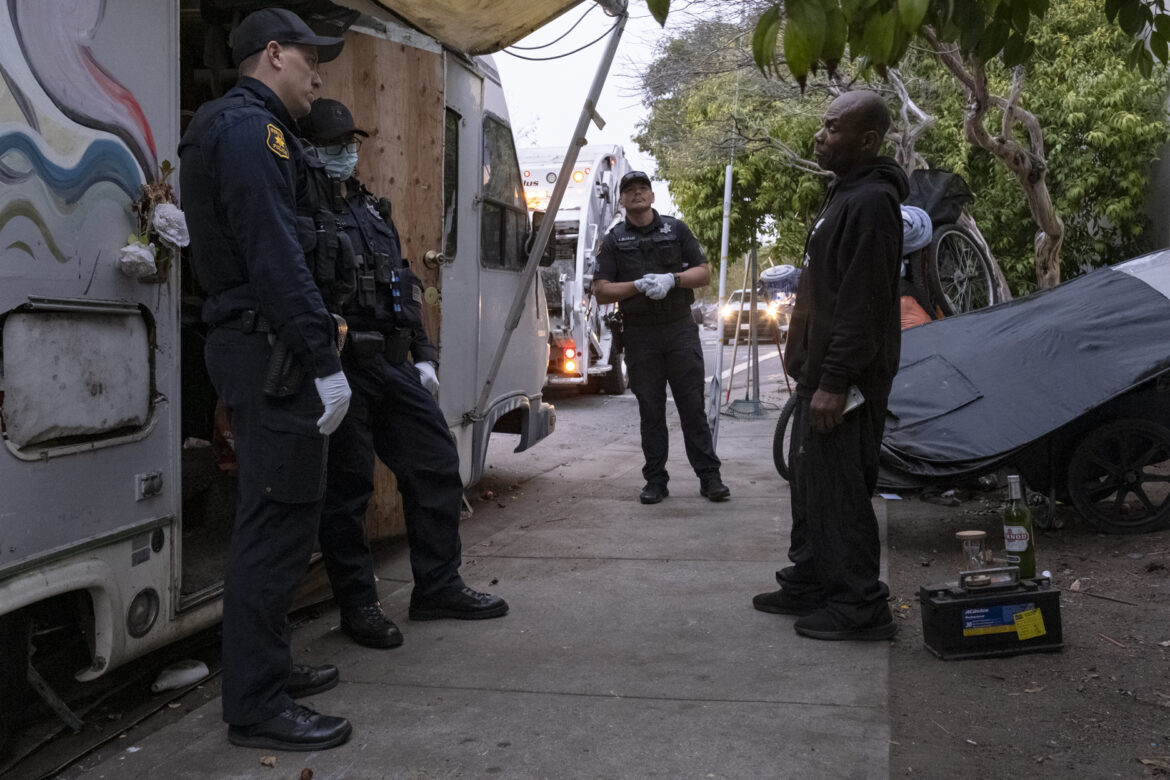
Yesica Prado / San Francisco Public Press
7:35 a.m. A Berry Bros. truck arrives to tow Dante’s vehicle. Dante bargains with the cops to get his ice chest out of his RV. Radu says he “gave him a year” to get his vehicle into the safe parking program. But that’s not entirely true. I tried to help Dante. In late February, I called Tony Alcutt, the only Berkeley outreach worker who officially places people in shelters, multiple times to try to help Dante get into the city sanctioned lot, because Dante had no phone at the time. Alcutt denied Dante a space because the lot was full.
7:41 a.m. Everyone else down Eighth Street is still sleeping. Dante tries to grab some of his belongings, but Radu won’t let him. Radu throws Dante’s shoes back into the RV through the broken windshield and does a final check before towing the vehicle.
Along Harrison Street between Seventh and Eighth, Public Works staff remove possessions along with garbage. This is where Chris and Jennifer park their easy-up shade structure next to Galtney’s RV. Mike and Angel are also on that curbside. In the background are 11 tarps and two canopies, which are later destroyed by Public Works.
7:44 a.m. After Dante pleads with Radu and the police, two public works employees pull his pressure washer out of the garbage truck and return it to him.
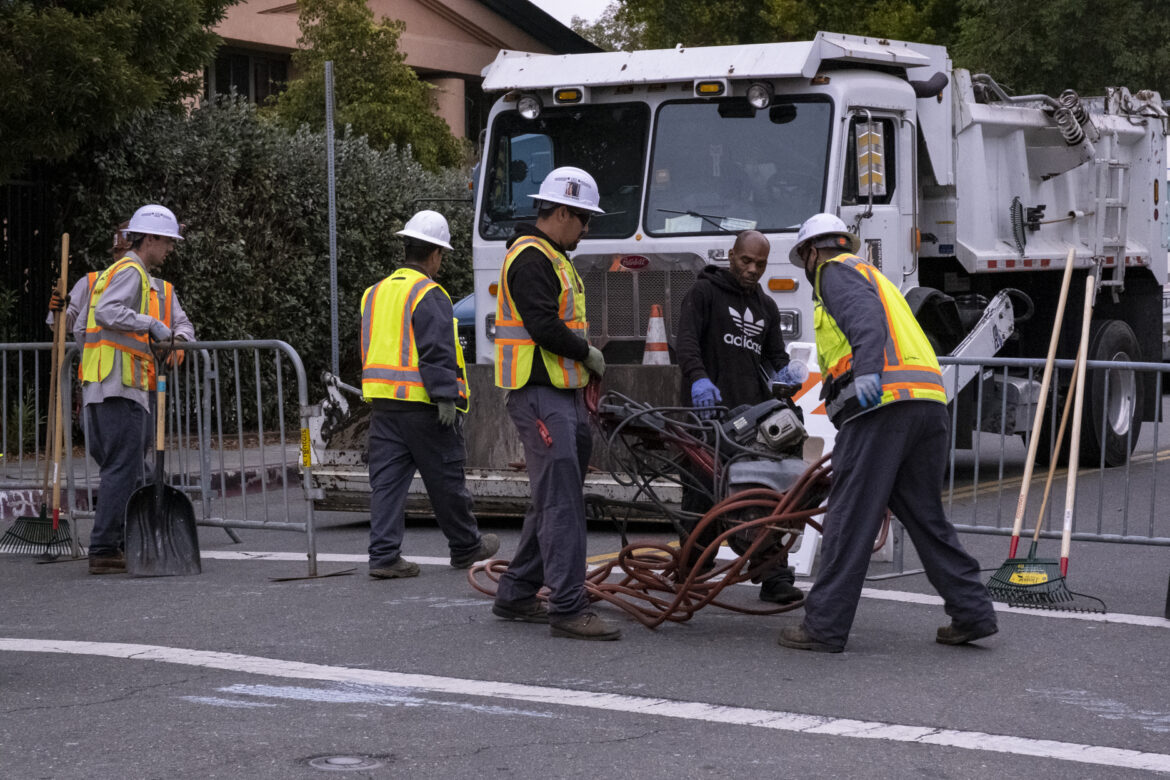
Yesica Prado / San Francisco Public Press
7:52 a.m. Police officers talk among themselves about being short staffed and comment about the unnecessary force present here today. “This job could have been done with two police officers,” says one of the officers.
8:04 a.m. Dante’s RV is towed away.
8:11 a.m. Dante sits on his red ice chest to rest. It has been a stressful morning for him. He tends to his knee injury that is bandaged up. City staff have reduced his property to a couple of plastic bags, a few tools and a bike.
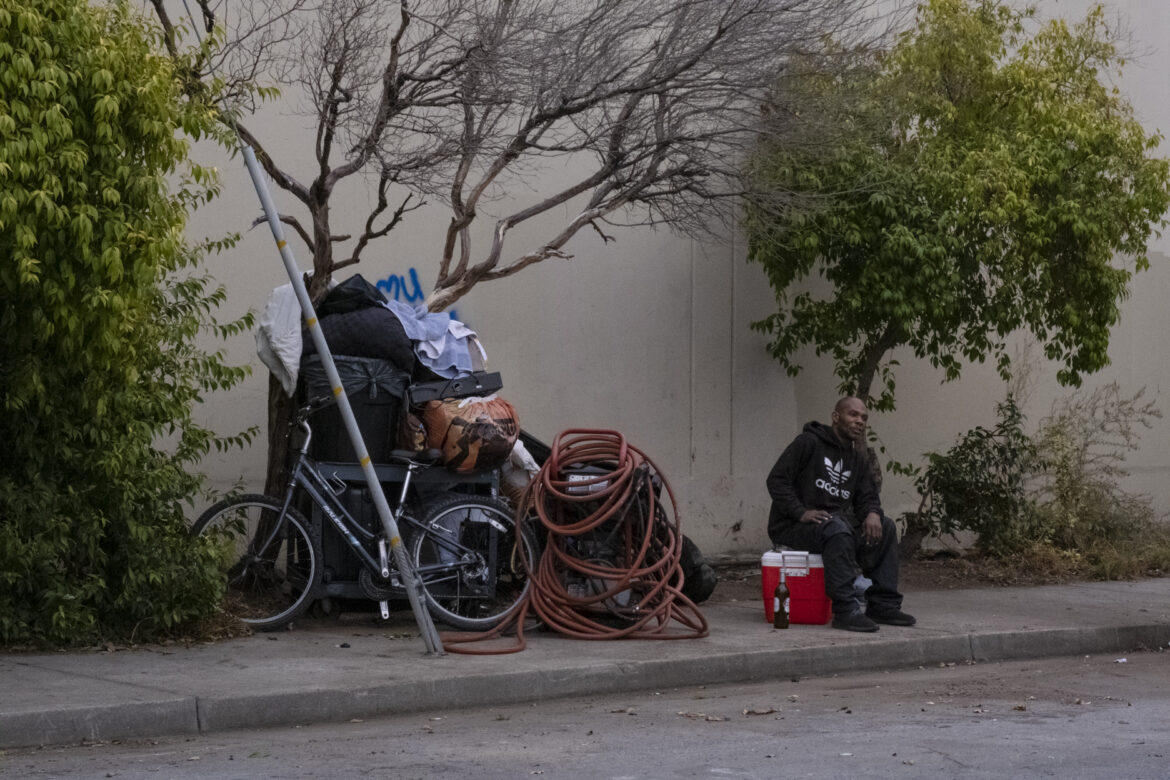
Yesica Prado / San Francisco Public Press
8:24 a.m. Andrew Vanderzyl stands outside his van wearing brown overalls and a red shirt, but only one shoe. Police knocked on his van five minutes earlier and asked him to come out. He puts his hands in his pocket and waits for someone to speak to him. Sgt. Bejarano tells him, “There’s somebody we are gonna hook you up with. They are gonna get you taken care of.”
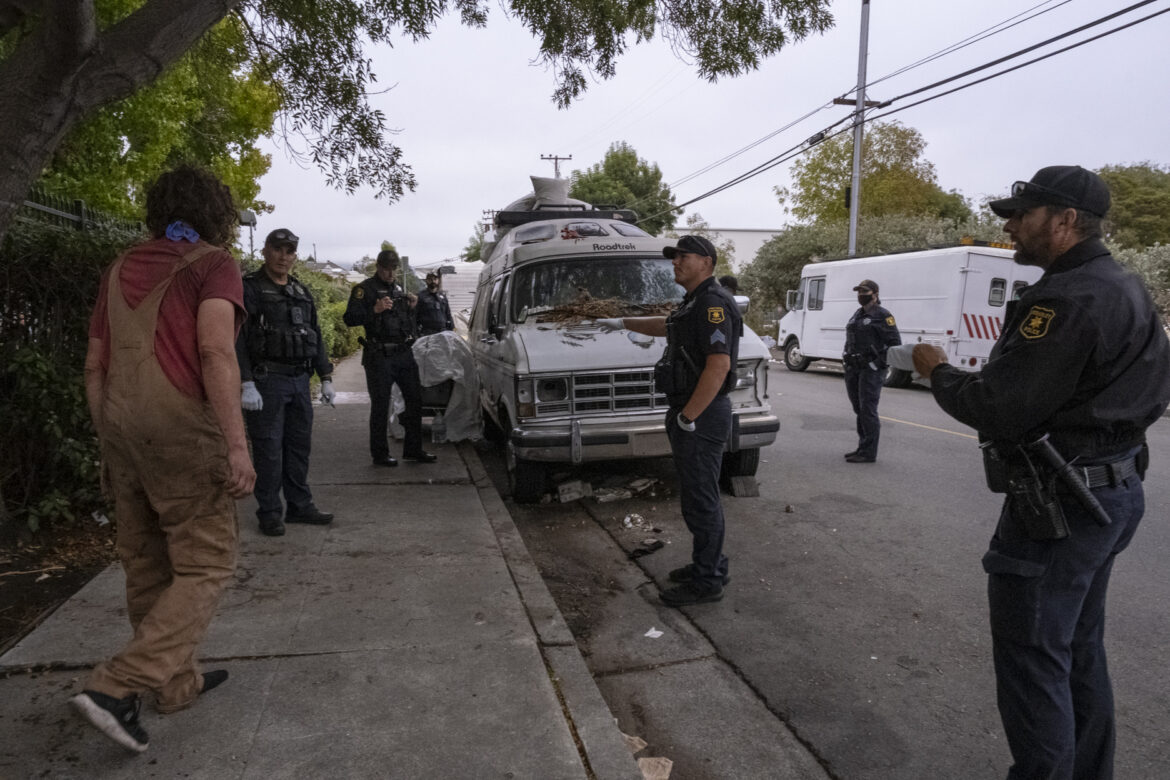
Yesica Prado / San Francisco Public Press
8:25 a.m. Radu is talking with Vanderzyl now. “So, we spoke on Friday,” Radu says.
“Yeah, and I got it all cleaned up. I just have a bike trailer,” Vanderzyl says, and briefly pauses. “But you guys can take that if you want.” Vanderzyl swings his arms in defeat.
“I advise you to get your valuables,” Radu says. “This vehicle has been declared a health hazard.”
“No, I … there are no rodents in there, sir,” Vanderzyl says. “I swear. There are no rodents.”
“I hear what you are saying, but we are past the point of arguing that,” Radu says. “It’s been declared a public health hazard. We are going to take the vehicle.”
Thomas tries to negotiate. “Can I roll it out? Can I roll it down the street?” he asks.
“No, you can’t roll it down the street,” Radu says.
“Can I have somebody tow it?” asks Vanderzyl. “Where would your destination be?” asks Radu. “To a friend’s driveway in El Cerrito,” Vanderzyl replies. He waits for an answer. “Please man, this is all I have.”
8:28 a.m. Vanderzyl begs for a reprieve. “Please don’t, please don’t take my vehicle. I’ll have this thing moved. I’ll have this thing moved today,” Vanderzyl says. “Please, sir. It’s my, it’s my home.”
Radu tells Vanderzyl the city can take him to a shelter, but Vanderzyl says he wants to stay in his van. He explains that he has a minor electrical problem that is stopping him from driving away, but he promises to move his vehicle today if they let him. But Radu isn’t budging.
8:30 a.m. Chloe tells Radu she wants to know the specific citations they’re using to clear the encampment. Radu pulls out a document. This is the first time we see the report curated for the city manager. Radu points to a photo as evidence for why they will tow Vanderzyl’s van. But there is nothing we can see in the report that specifies which vehicles are hazards.
8:31 a.m. “Would you like to be taken to shelter? We can take you there right now,” Radu says to Vanderzyl.
“But the health hazard has been abated. You have removed all the trash. So like I said, you don’t need to take the van,” Chloe says.
Radu tells Chloe she can file an appeal. She and Radu argue about whether the report condemning Vanderzyl’s van was legally sufficient.
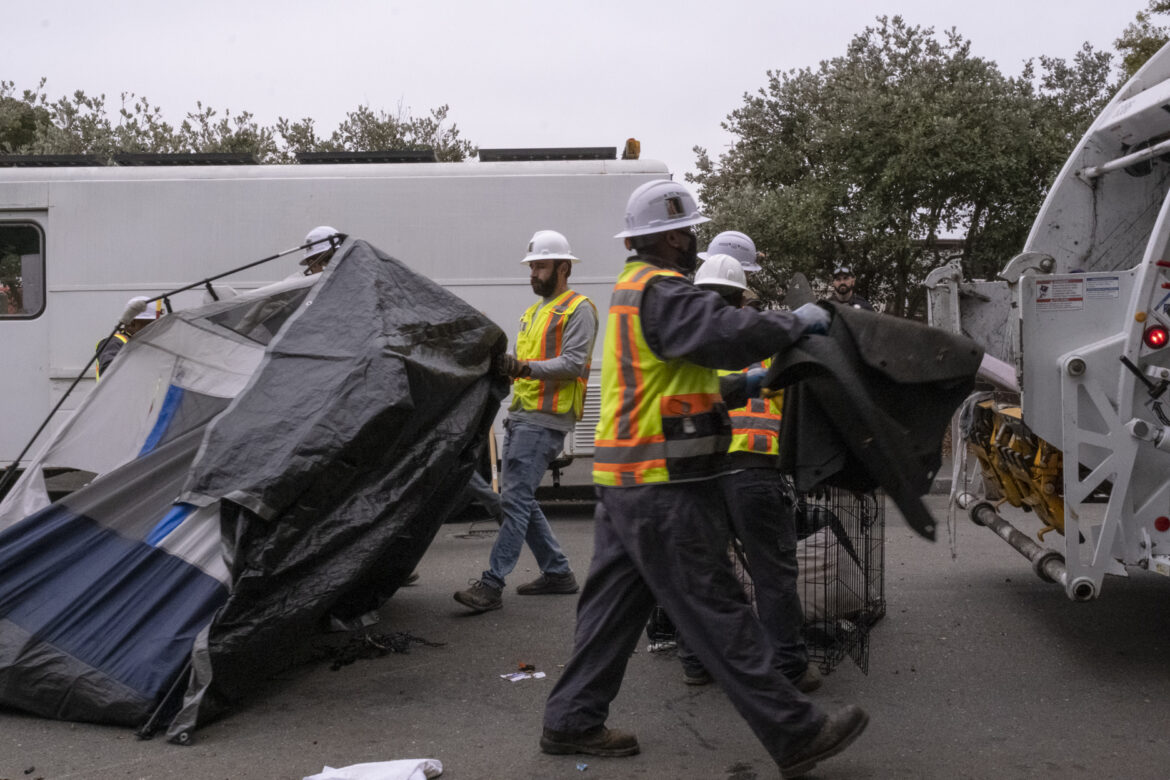
Yesica Prado / San Francisco Public Press
PART TWO: DESTROYING SHELTERS
8:54 a.m. Radu and three Berkeley police officers begin announcing to the people on Eighth Street that their tents and other items will be removed. They ask them to take any valuable possessions to the other side of the street.
8:55 a.m. Radu speaks to Shawna Garcia and gives her a 20-minute warning. She tells him that her service dogs take more room than the two-person tent the city will provide. Garcia turns down shelter out of fear of being sexually assaulted. Radu tells her that everything that doesn’t fit in the new tent will be thrown away.
8:59 a.m. Ian Morales, an outreach worker from the Homeless Action Center, tells Radu that he is violating the Fourth Amendment, which prohibits unreasonable search and seizure. Radu says the city will not store “big bulky” items.
9:02 a.m. Radu speaks to Alice Barbee and Mackie. Barbee says she and others were not adequately informed of the extent of the abatement. She says they thought the city was only coming through to do a cleaning. Mackie is distraught that his brand new tent will be taken away.
9:04 a.m. Radu says the city only allows two-person tents that are 7 feet by 5 feet. He offers them shelter at the Old City Hall, saying that Barbee’s dog would be allowed there. Barbee says she doesn’t want to give up her belongings, because then she would have nothing.
9:06 a.m. Vanderzyl’s van is taken away to Avenue Berkeley Towing. The vehicle is damaged when it’s taken up the ramp.
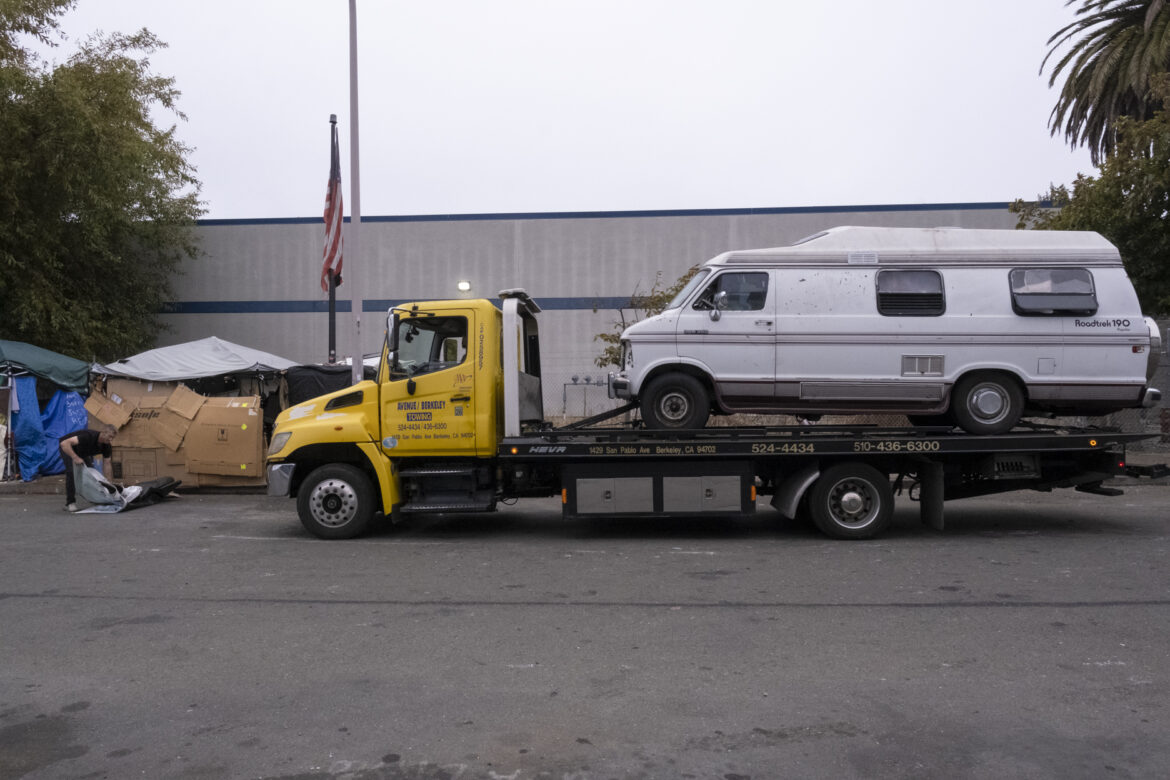
Yesica Prado / San Francisco Public Press
9:07 a.m. Radu talks to Sherif, a disabled veteran from the former Ashby Shellmound encampment. Sherif says his tent area is clean and that he will be unable to move things because of his physical disabilities. When he tells a Berkeley police officer that he needs help, no accommodation is offered.
9:20 a.m. Thomas Barnett sweeps around his van. His electric scooter, cans, clothes, food and copper wiring for recycling were confiscated and thrown out. He still has his vehicle, but the majority of his property was trashed.
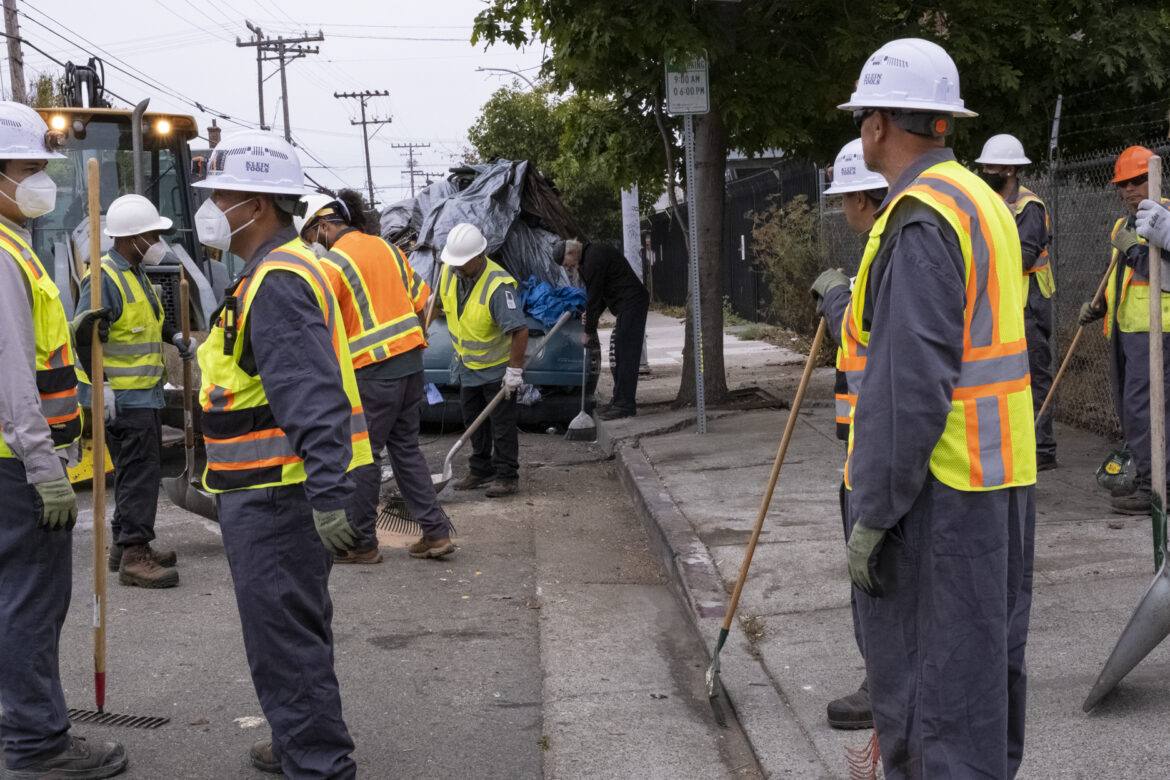
Yesica Prado / San Francisco Public Press
9:32 a.m. Jennifer tries to pack up her belongings, but the workers throw them away, picking up everything in their path. Workers dismantle her bed and toss it into the garbage truck.
9:33 a.m. All the structures at Eighth and Harrison have been demolished, including the one in which Chris was living. “It was sturdy and strong,” he says. “I will make the next one stronger.”
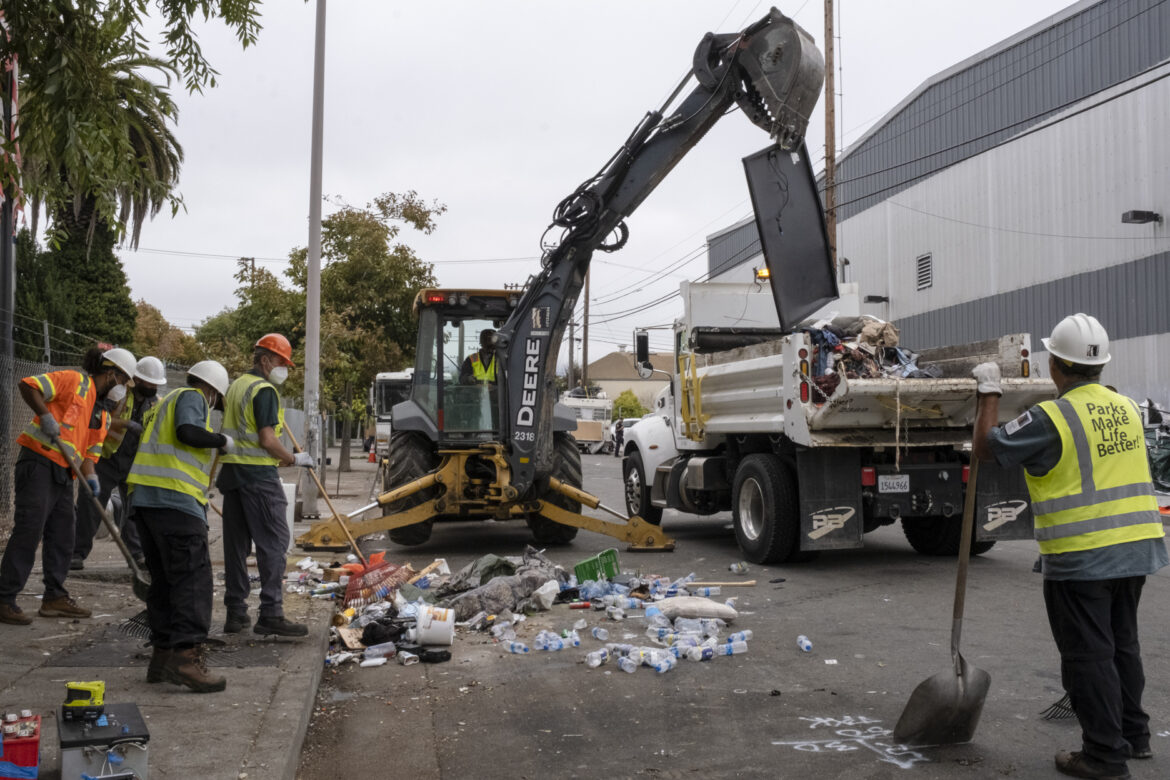
Yesica Prado / San Francisco Public Press
10:04 a.m. Angel stands on Seventh Street with her bedding, a few clothes and a stuffed tiger. She’s keeping her friend’s bike safe, so the city will not also seize it.
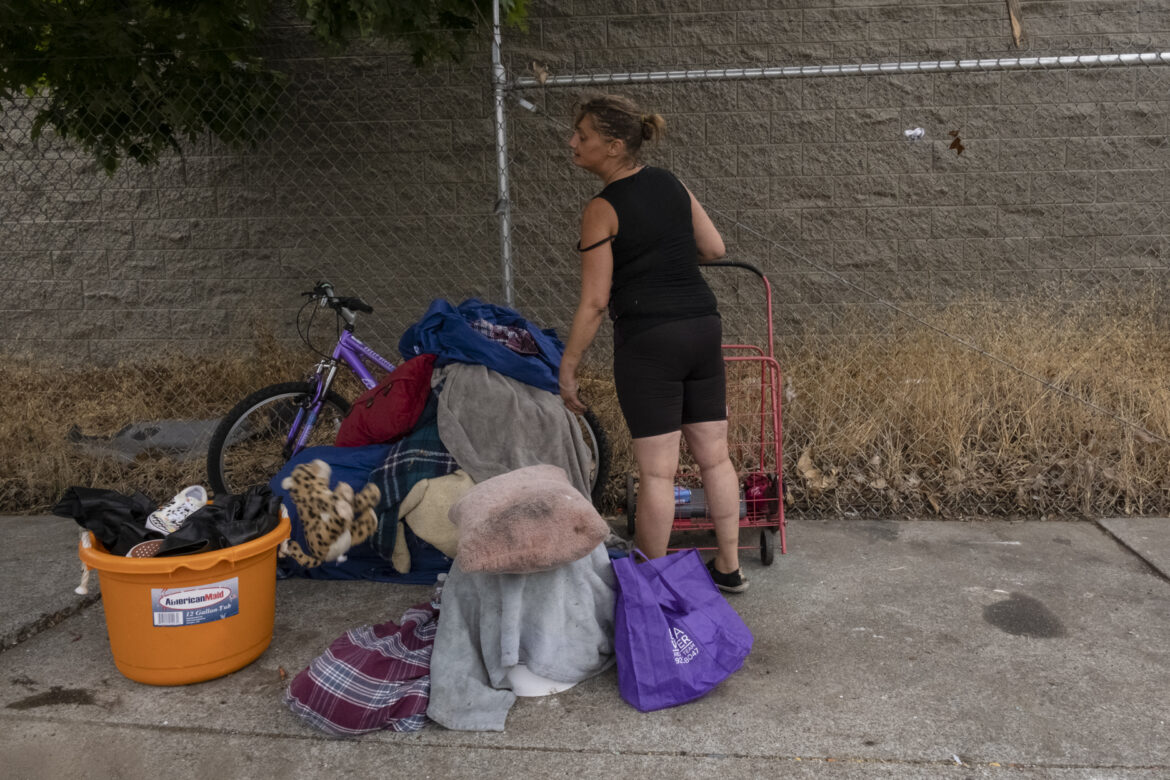
Yesica Prado / San Francisco Public Press
10:10 a.m. RJ is sitting outside his tent. He is not wearing any pants. City staff woke him up to tell him to get out of his tent, but they have not offered him any help.
10:11 a.m. Shawna Garcia is asking for help. She feels threatened, and fears being pushed back to Second Street, where the city was allowing people to live in tents and makeshift structures — but that was also where her abusive ex-boyfriend was living. (On Nov. 22, the city posted notices that part of the Second Street encampment would be dismantled and vehicles parked in that area would be towed.)
10:16 a.m. Outreach worker Tony Alcutt sends a text to Bay Area Community Services to inquire about an assessment for Garcia, but there is no guarantee she will receive help.
Ian Morales, an outreach worker from the Homeless Action Center, finds out later that no one informed Bay Area Community Services — the organization responsible for navigating people into shelters — ahead of the encampment sweep.
10:18 a.m. Shawman is clearly in distress. After city employees take her tent, she scrounges in the roadway trying to save whatever food she can gather.
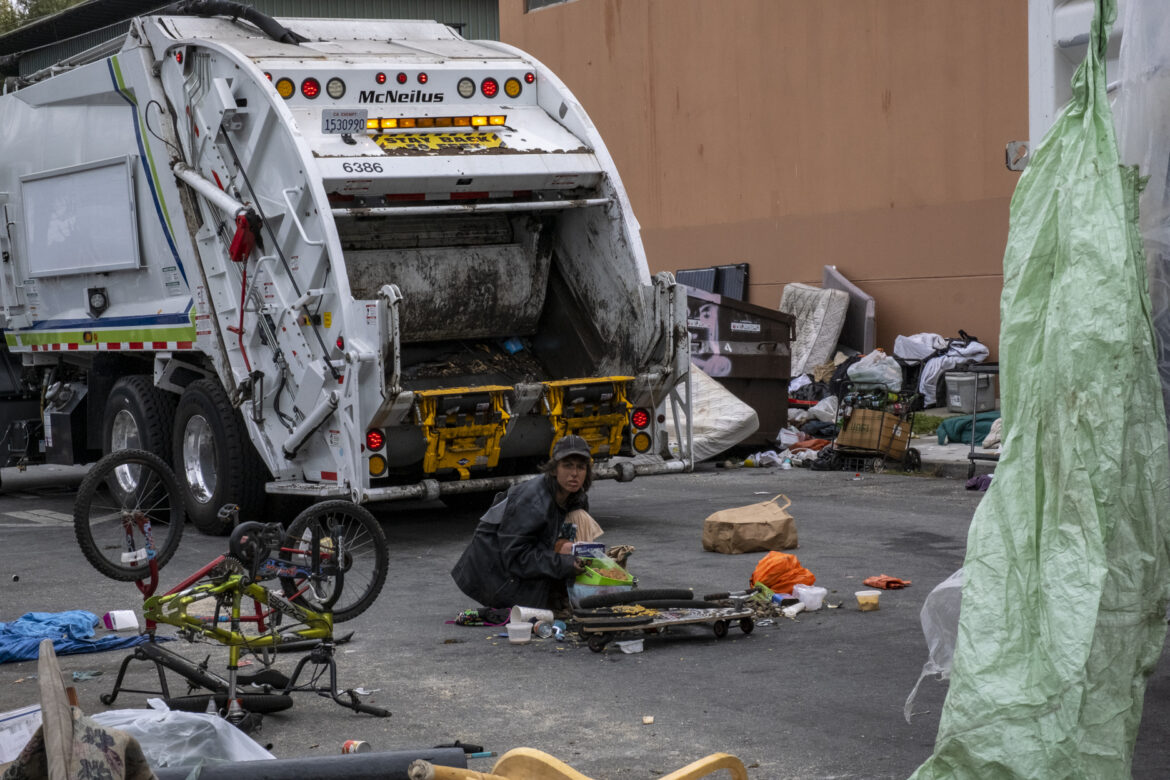
Yesica Prado / San Francisco Public Press
10:20 a.m. Down the street, Okeya Vance, supervisor of the Homeless Response Team, is cracking jokes with Officer Hartley and other police officers. Boone walks past them with all his recycling on a stroller. He leans on the stroller as his left foot is fractured. He says he is going to cash it in down on Third Street and come back for the rest of his belongings. But minutes later, it’s all thrown away.
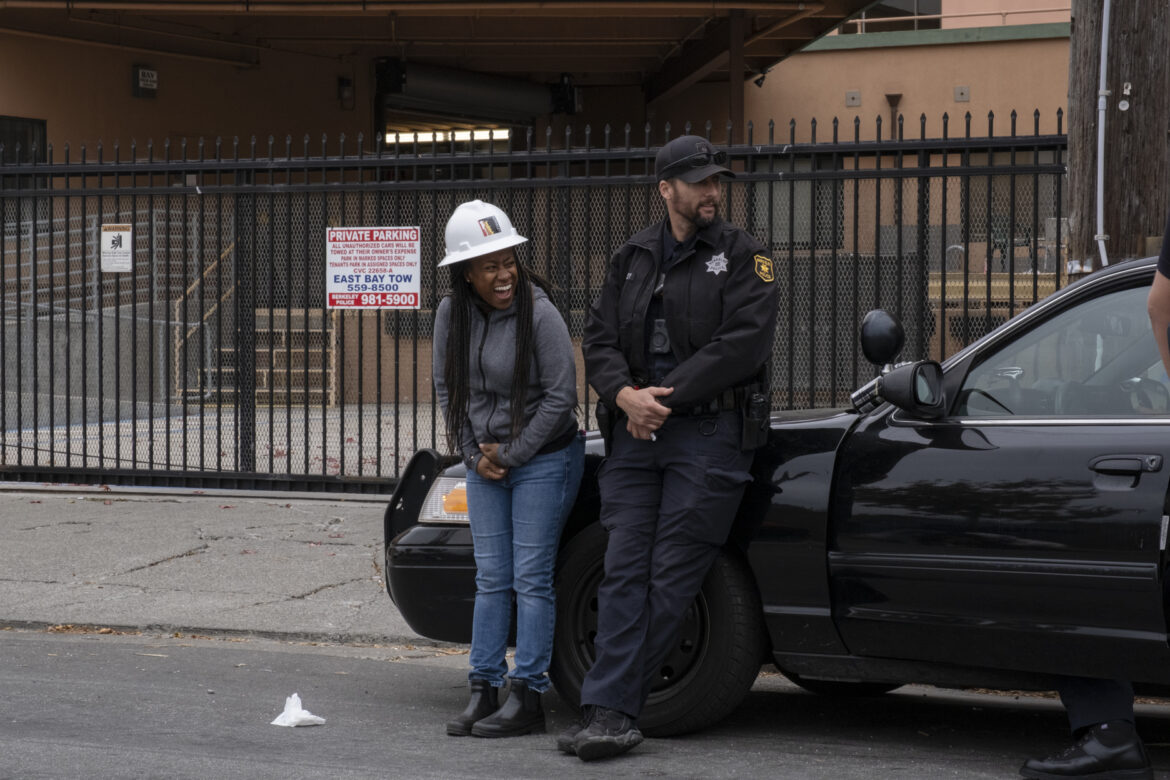
Yesica Prado / San Francisco Public Press
10:33 a.m. Workers throw everything that is left into the middle of the street to be scooped up by the bulldozer.
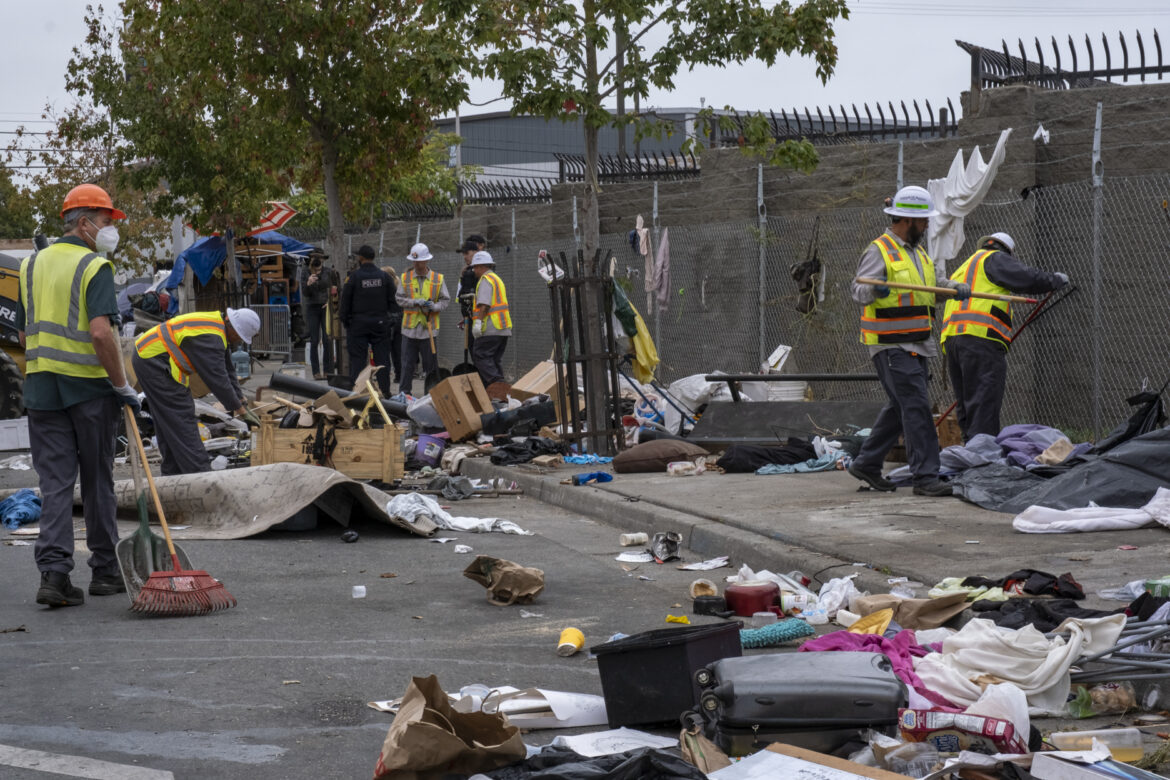
Yesica Prado / San Francisco Public Press
10:34 a.m. People stand around in shock. They salvage anything they can and drag it across the street.
10:35 a.m. Shawman watches Public Works clear her remaining possessions. She sits shoeless, wearing unmatched socks, guarding her friend’s bikes and skateboard.
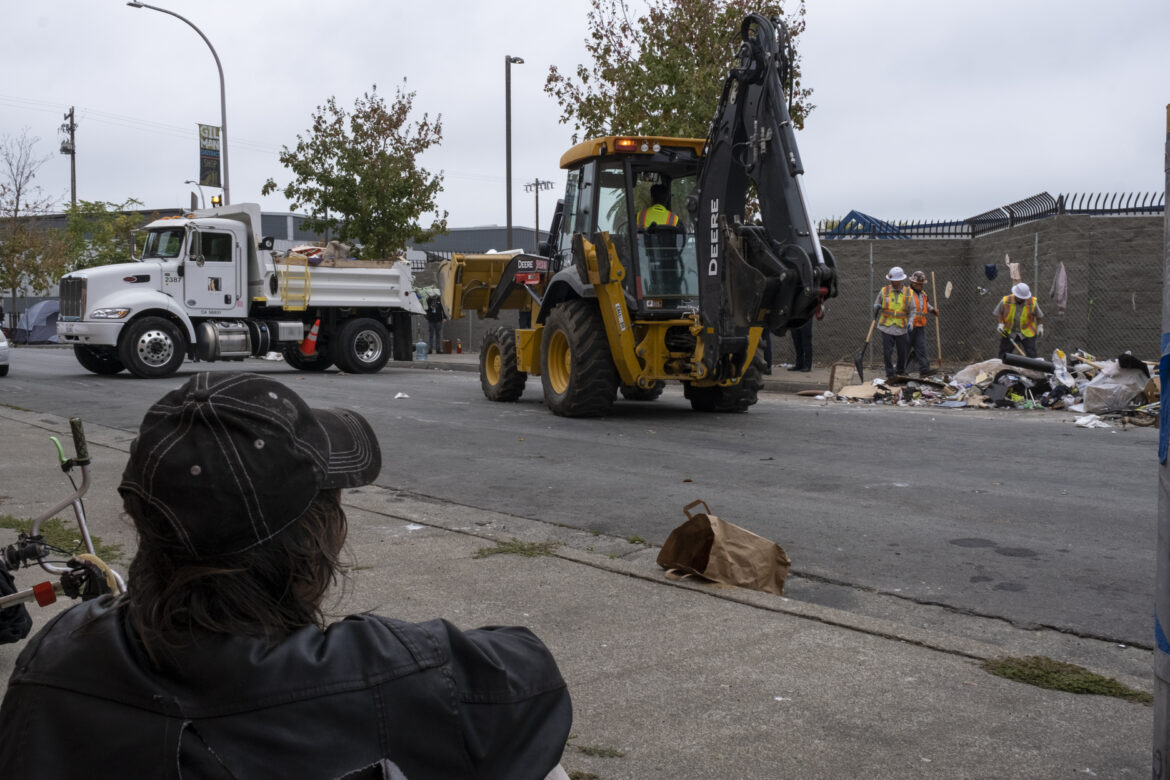
Yesica Prado / San Francisco Public Press
10:36 a.m. The canopy structures have been torn down. A chest of drawers is half open after residents rushed to empty it out, leaving behind other essential items like a portable heater, batteries and tarps.
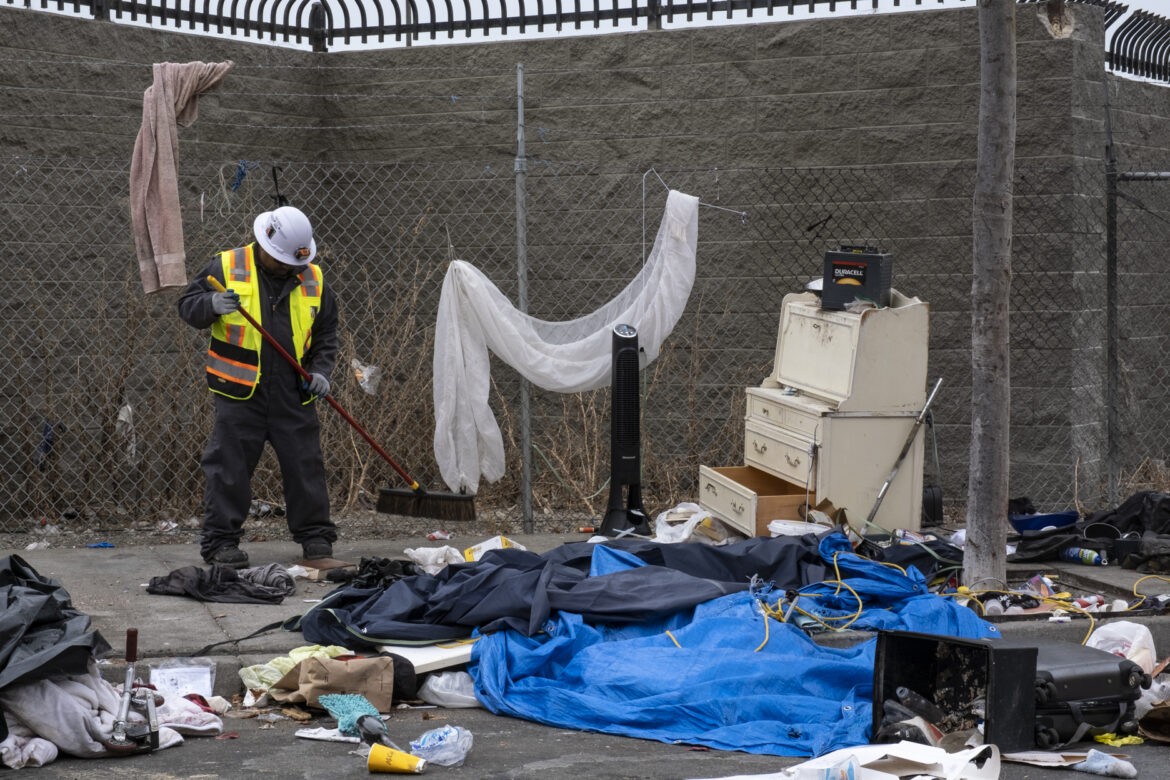
Yesica Prado / San Francisco Public Press
10:53 a.m. Clarence Galtney rushes to move items across the street, hoping to save them. Alice Barbee is having a hard time breathing. She has asthma and cannot find her inhaler. Radu is closing in on her, raking her belongings on the ground. Eight police officers surround her area, watching her in distress.
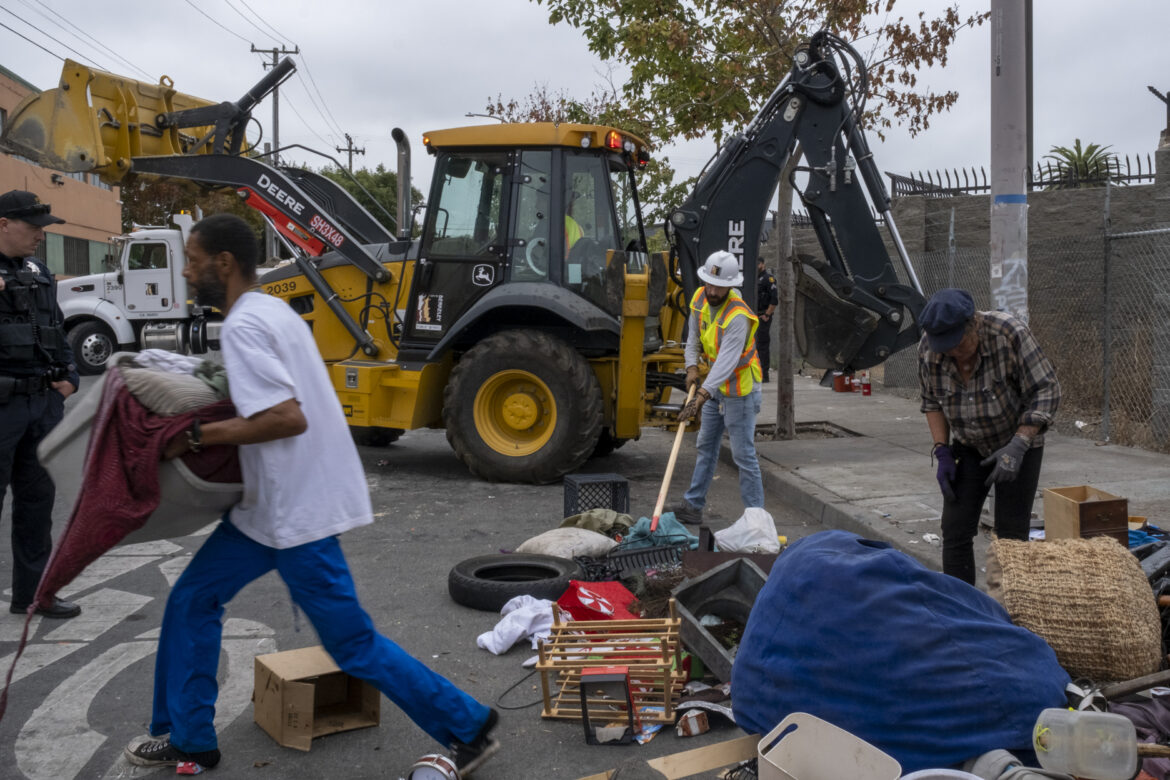
Yesica Prado / San Francisco Public Press
10:58 a.m. Barbee tries to reach for one of her tennis shoes and catches it before it is swept away. She asks Radu to give her time to gather the rest of her belongings, but he ignores her. Barbee asks police officers watching if they could keep Radu away from her. The officers look at each other in confusion — they don’t seem to know whether they are allowed to step in and help.
11 a.m. Sgt. Kleppe steps in from the crowd and tells Barbee she has a few minutes to gather the rest of her belongings, or she could be arrested for “obstruction of an officer’s duty.” Galtney rushes back and forth across the street, helping her carry bags of household items.
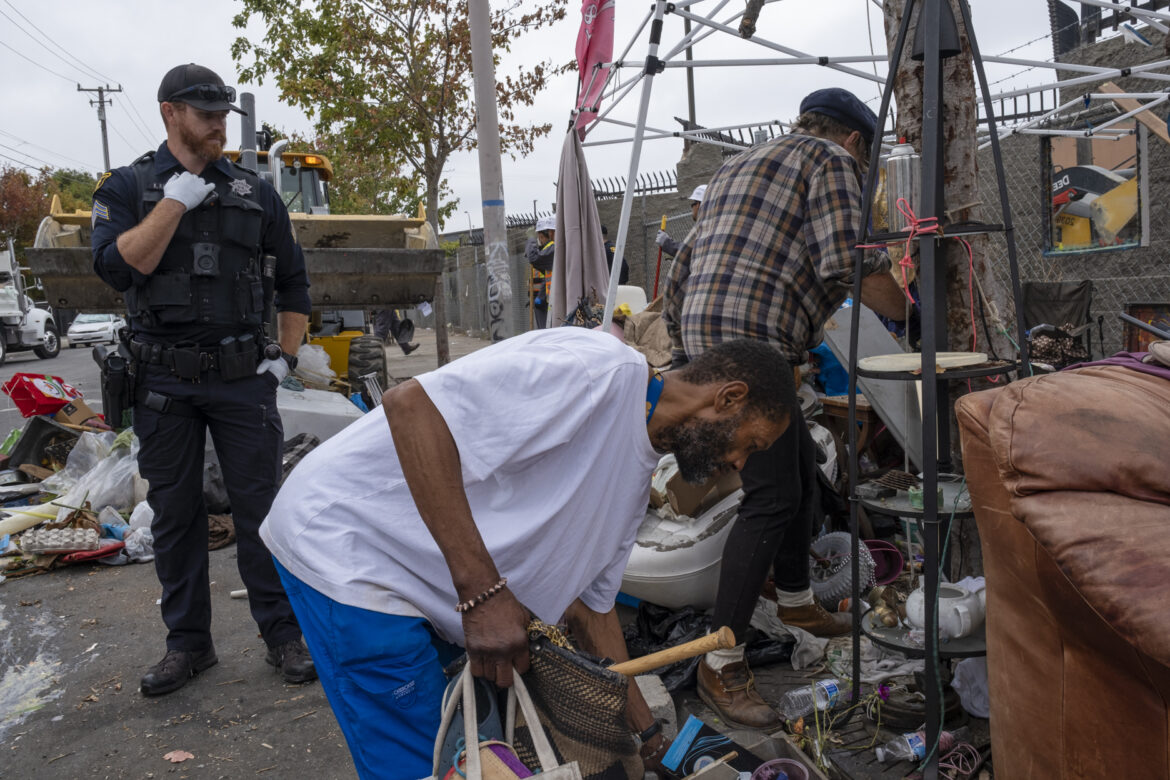
Yesica Prado / San Francisco Public Press
11:15 a.m. Public Works reaches Heather, the last person on the sidewalk. Her friend is helping her gather her clothing. They have taken the mattress where she slept. Heather wraps her clothes inside a net that she had used as a wall to protect her space.
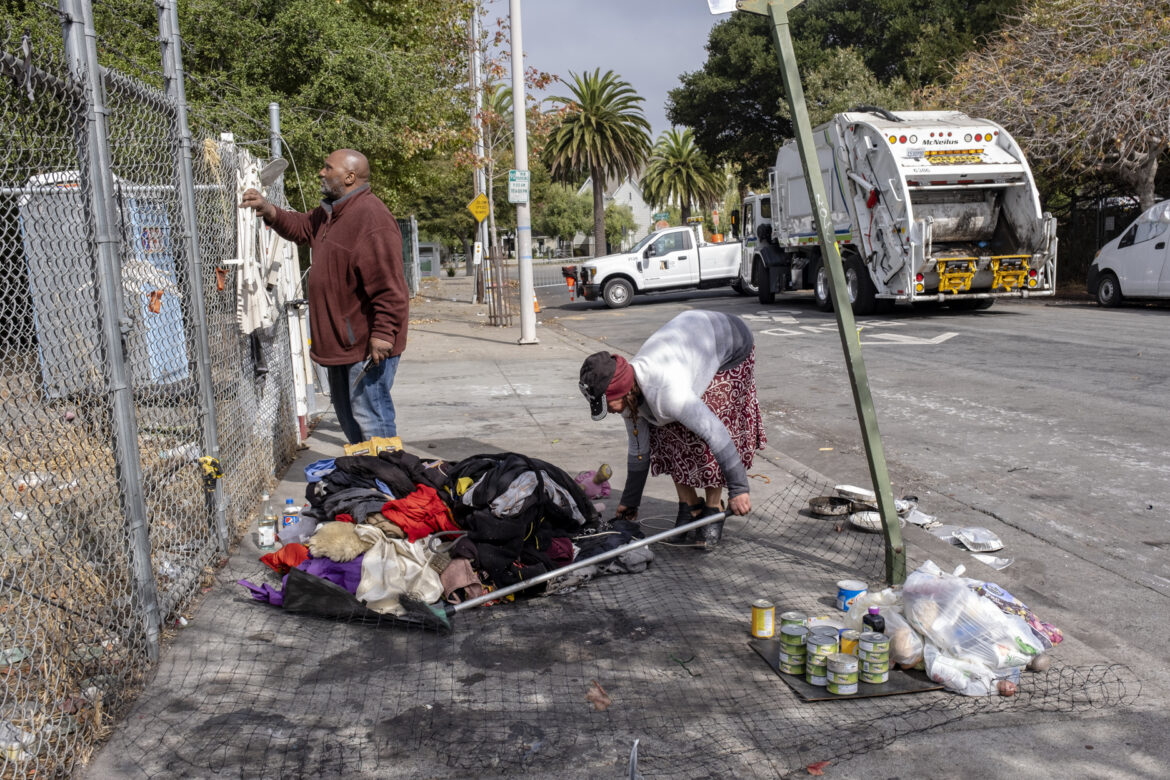
Yesica Prado / San Francisco Public Press
11:17 a.m. I spot Officer White, Berkeley Police’s public information officer, and I want to ask him why Berkeley Police is here en masse. But he says today he is not here in a communications capacity, and instead is providing “security” to city staff because the police department is short staffed.
11:18 a.m. Alice Barbee is no longer allowed to retrieve any items. Everything remaining on her spot will be discarded.
11:19 a.m. Felix Torres sits on the stairs of the Berkeley Repertory Theatre building and begins to play his guitar, bringing some relief in the chaos. He sings, “How would you survive another day? They are crushing us.”
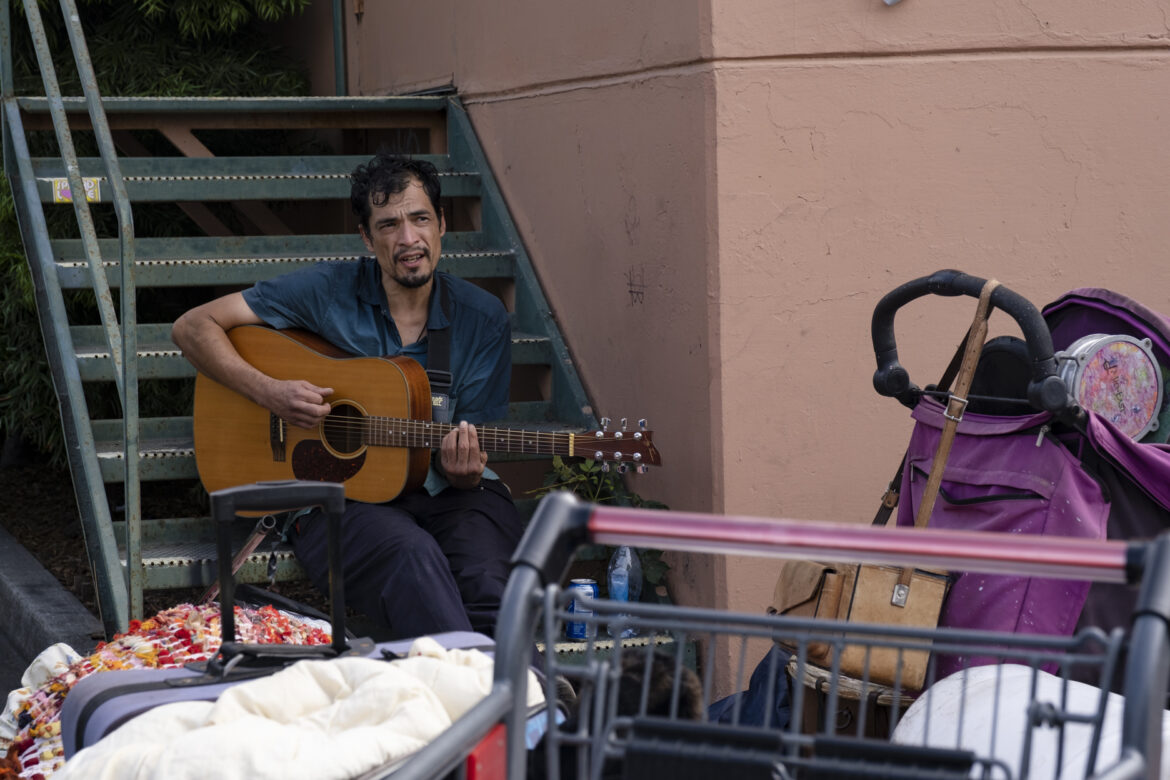
Yesica Prado / San Francisco Public Press
11:20 a.m. Barbee’s clean clothes get scooped up from the sidewalk and thrown into a garbage truck. All her sweaters and winter jackets disappear.
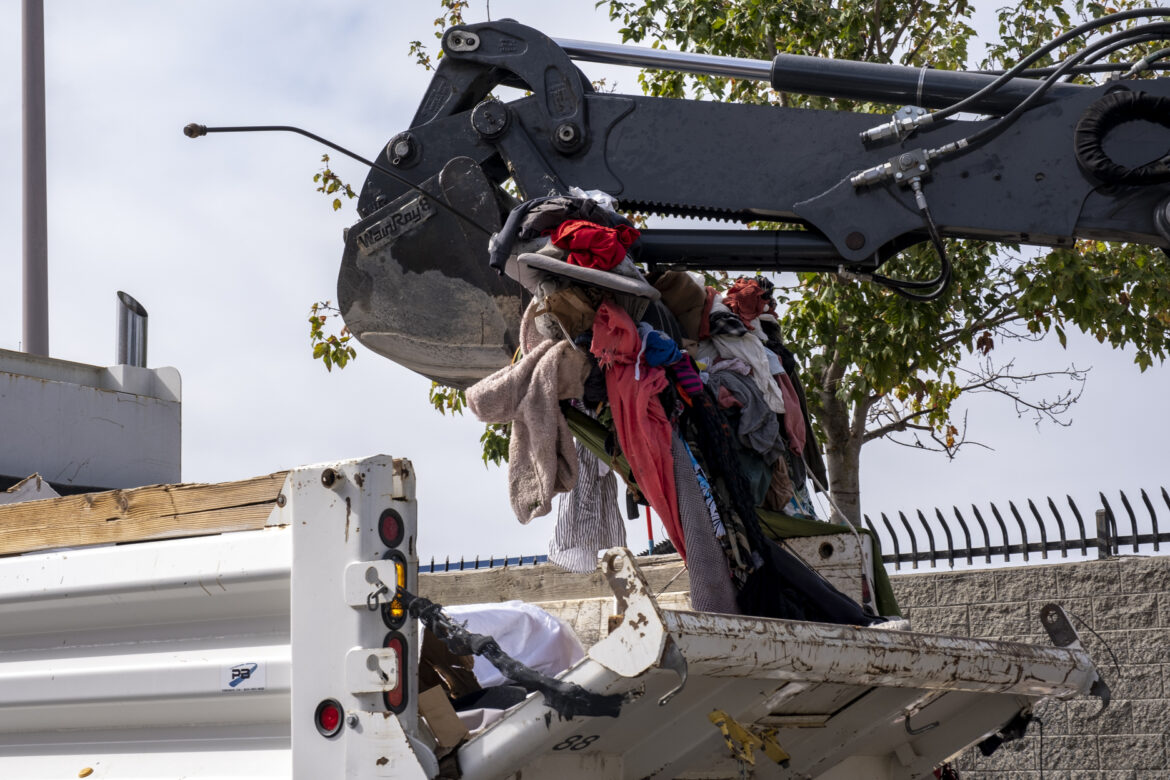
Yesica Prado / San Francisco Public Press
11:38 a.m. Some residents sleep next to the items they were allowed to save while Public Works finishes clearing the sidewalk.
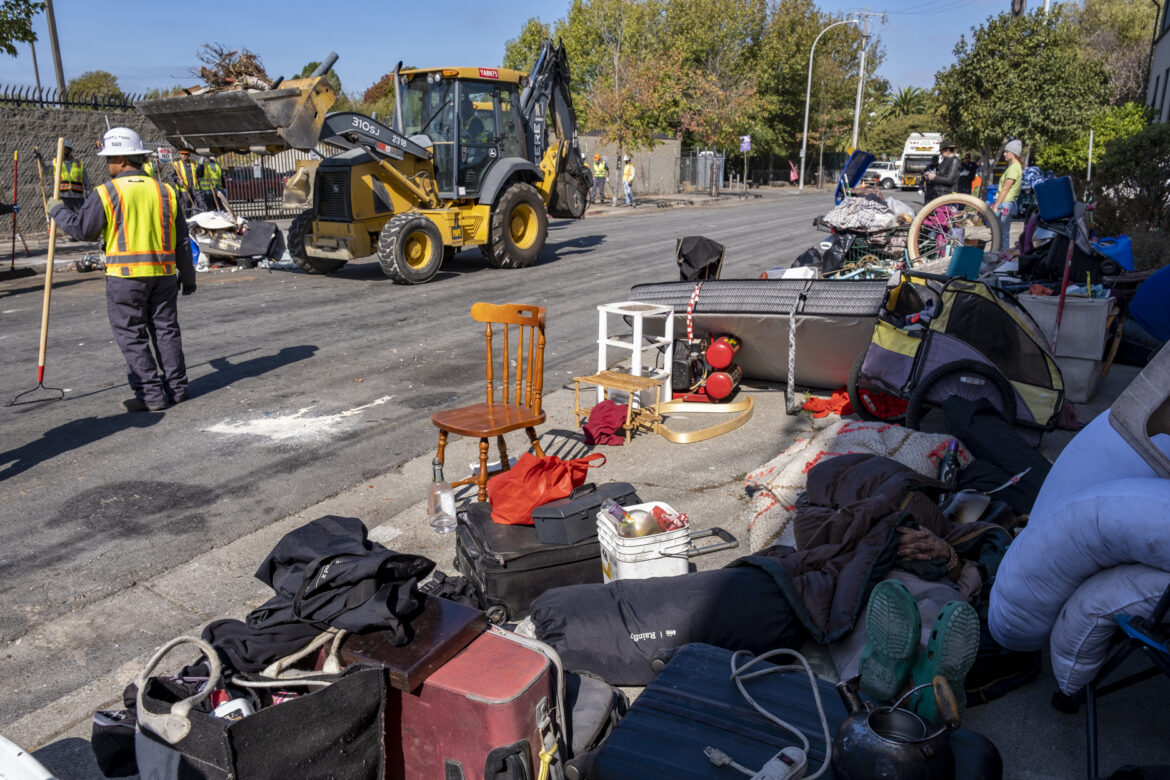
Yesica Prado / San Francisco Public Press
11:39 a.m. Rob, a veteran, packs all his property into a laundry wagon. He has been promised social services for months, but Vance tells him that he has to follow up on his own because his team doesn’t work with the Veterans Affairs agency. Rob had been living in a tiny home he built with wood pallets for the floor and plywood walls, using the skeleton of an easy-up shade structure for support, and an umbrella and a tarp for the roof.
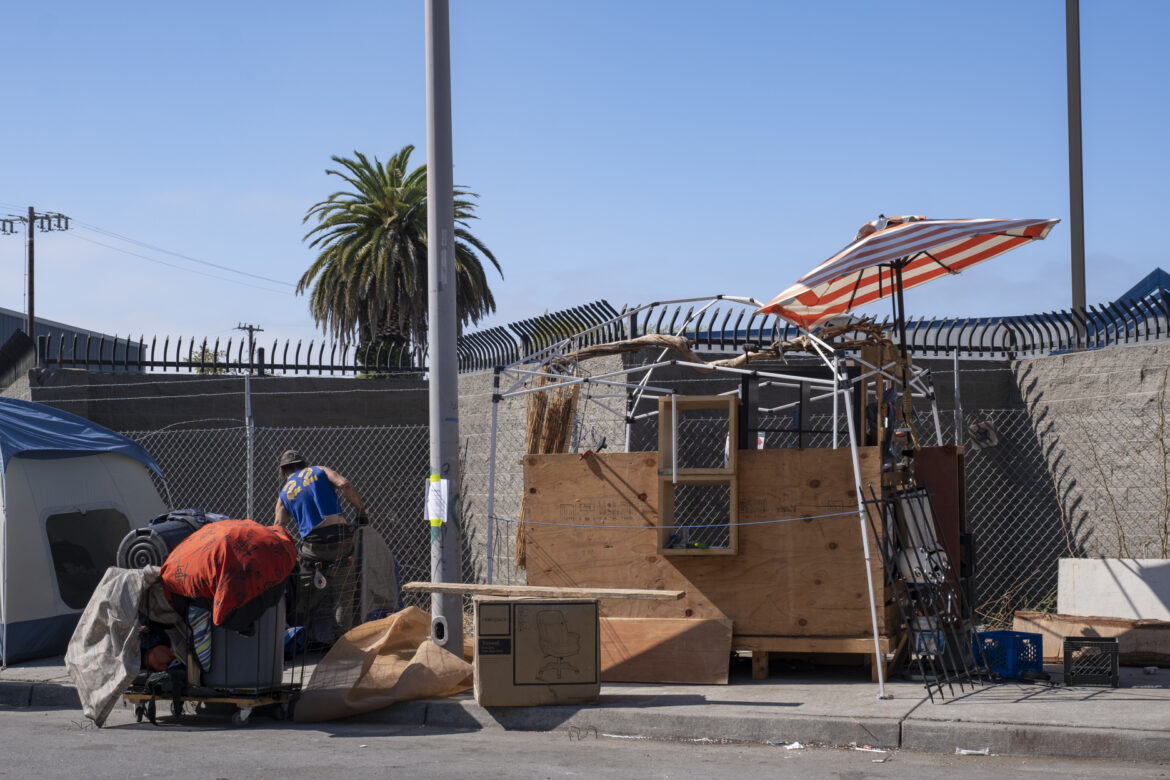
Yesica Prado / San Francisco Public Press
11:41 a.m. Six police officers surround Shawna Garcia to get her to move the rest of her things, but she only has a small wagon. Officer Hartley suggests asking other neighbors to help move her stuff out.
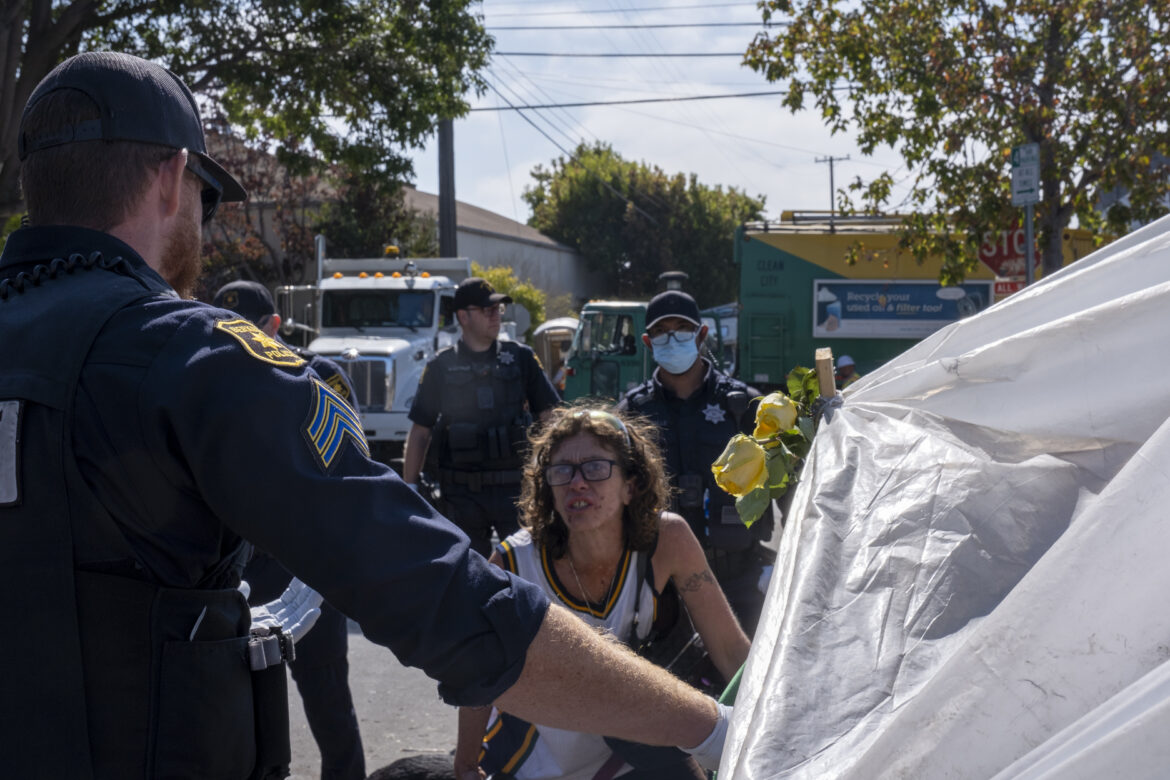
Yesica Prado / San Francisco Public Press
11:48 a.m. I step in to help. I dash inside Garcia’s tent to grab anything I can save. I see plastic bags on her bed that she has already started packing. Through her window, I see the scooper crushing the wood pallets and the umbrella from Rob’s tiny home.
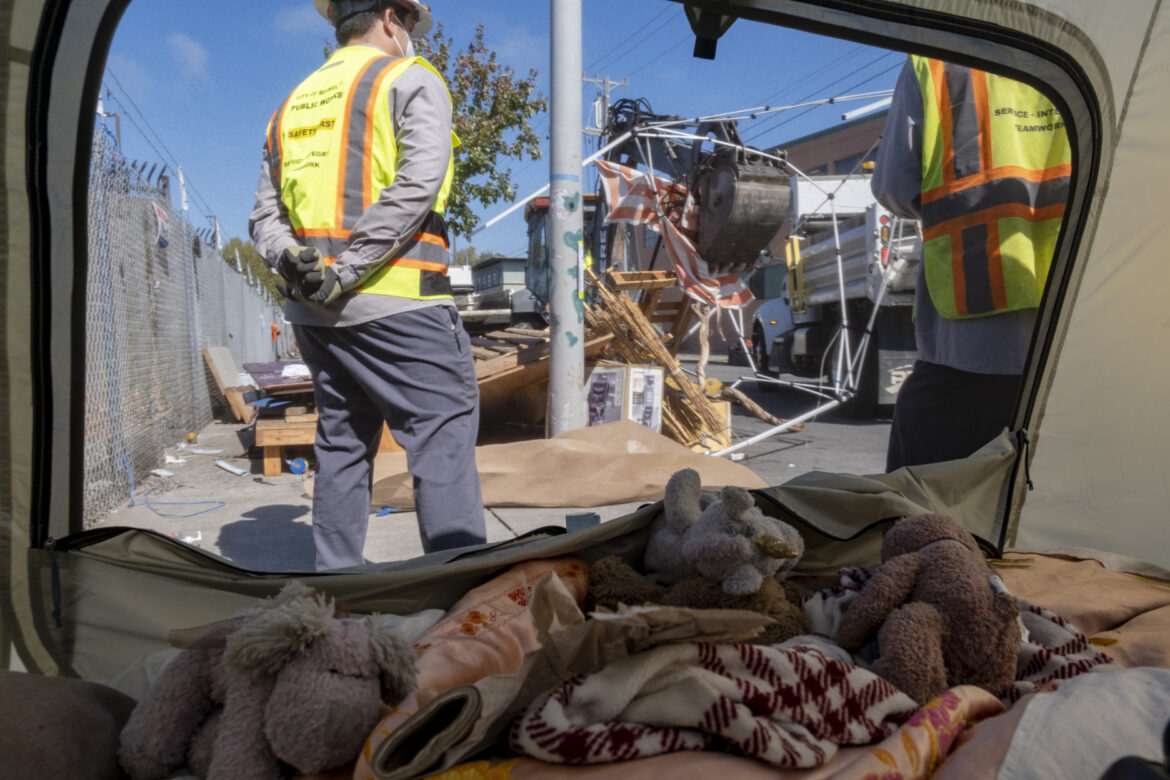
Yesica Prado / San Francisco Public Press
12:01 p.m. Outreach worker Eve Ahmed does not want me there while she assesses RJ, but he is persistent and says he wants me to stay. Ahmed is looking into a hotel room for RJ at the Berkeley Inn. But he’s not able to acquire a room there without an I.D. Two rooms have ADA accommodations, which he needs. Without identification, RJ cannot get into the motel tonight. He has two options: accept the two-person tent the city offers him or a shelter bed at Old City Hall. He chooses the tent.
Ahmed says, “let him be in the tent and put him on the list. We’ll accommodate him later if something else comes up.” RJ is left on the sidewalk with no pants on.
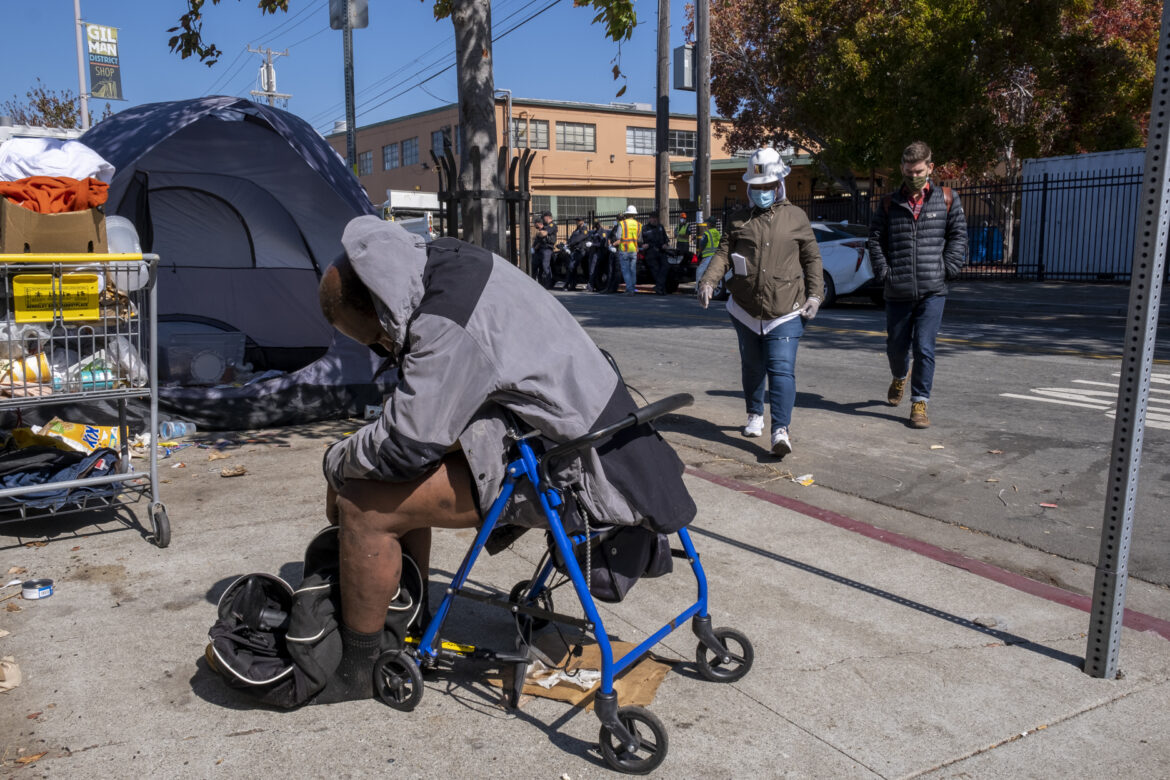
Yesica Prado / San Francisco Public Press
12:14 p.m. Radu proceeds to trash RJ’s tent because he says, “it’s covered in feces,” even though I had just cleaned out the tent after RJ stepped out. The tent was new — the Lifelong Medical Street Team gave it to him last week. RJ leaves to panhandle at the McDonald’s down the street on San Pablo after his possessions are thrown away.
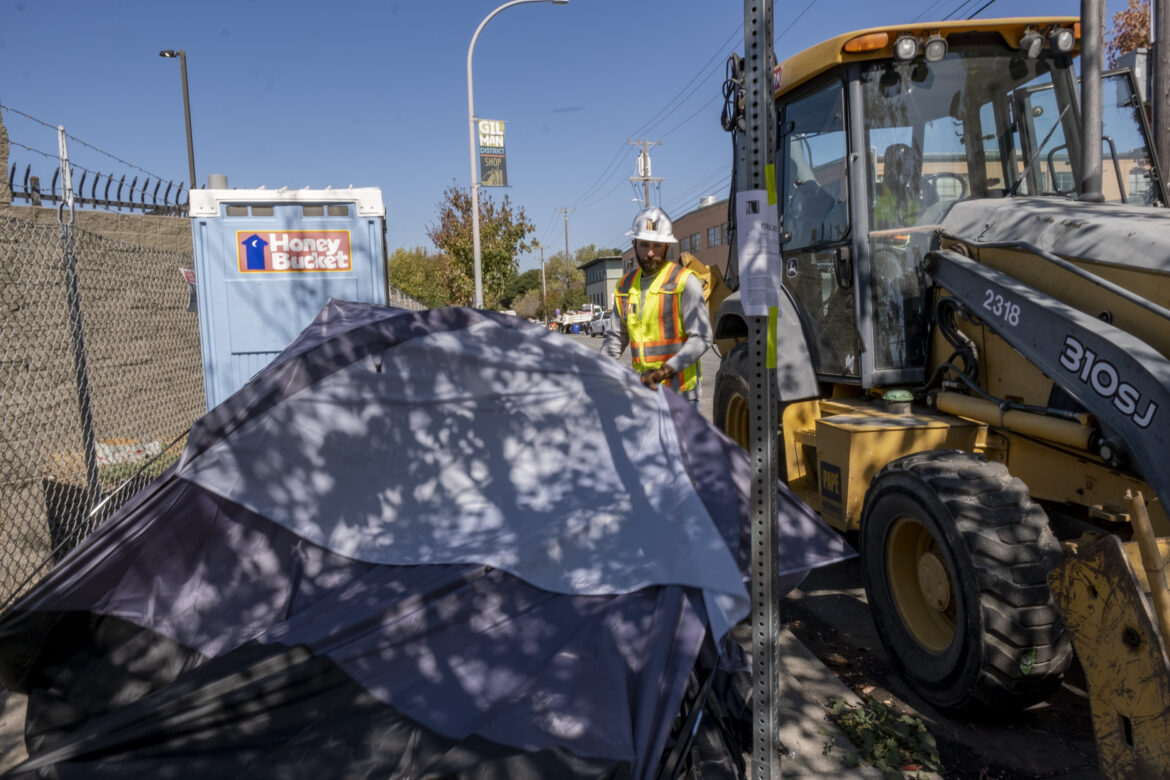
Yesica Prado / San Francisco Public Press
12:46 p.m. After everyone has been forcibly moved across the street, a city worker pressure washes the sidewalk.
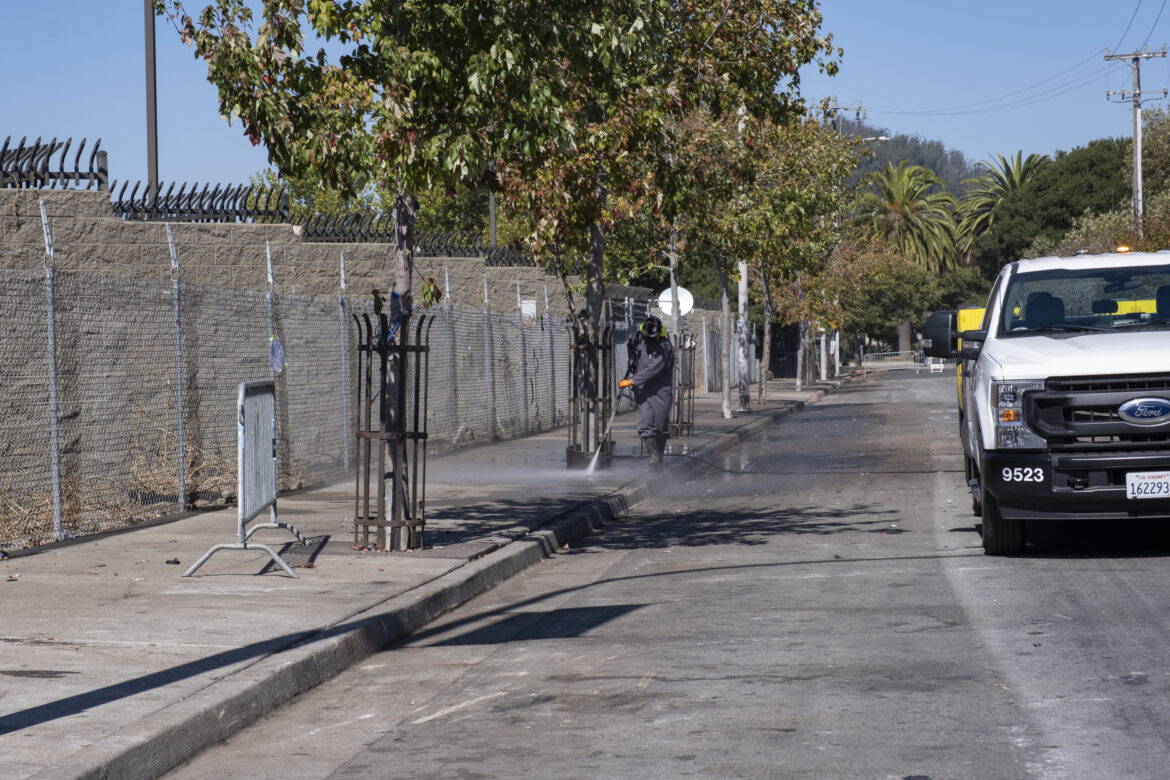
Yesica Prado / San Francisco Public Press
12:49 p.m. The city is cleaning at Harrison and Sixth streets in front of Urban Amadah where Jeff and his wife Eren, Garth and his elderly friend Dominique had all been living. Public works employees and cops pile together their belongings and say it’s all trash. Dominique tries to stop them, but he’s pushed out of the way by one of the workers.
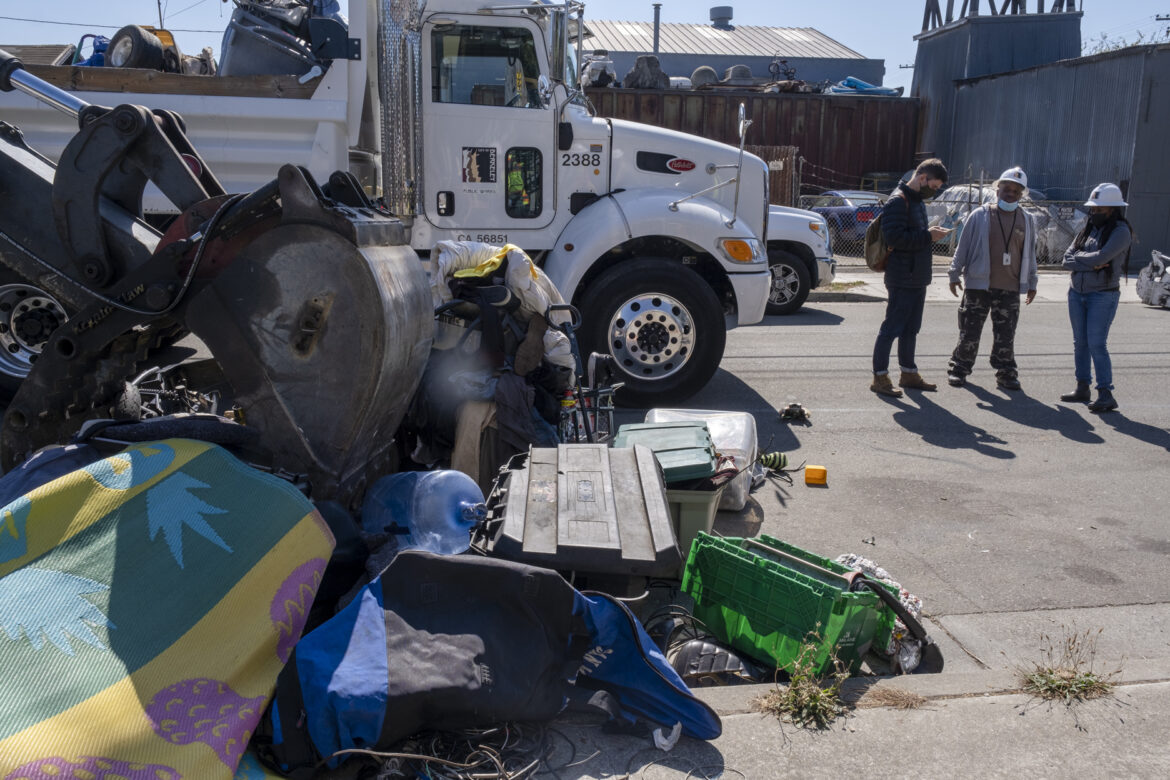
Yesica Prado / San Francisco Public Press
12:50 p.m. Garth is arguing with the police. He says he has tried to keep his area clean to avoid having his belongings taken. He says the warning notice was not specific enough. Police are threatening to arrest Garth, if he doesn’t give up his belongings.
“I want simple instructions on how I can save my property,” he says. “Nobody deserves this.”
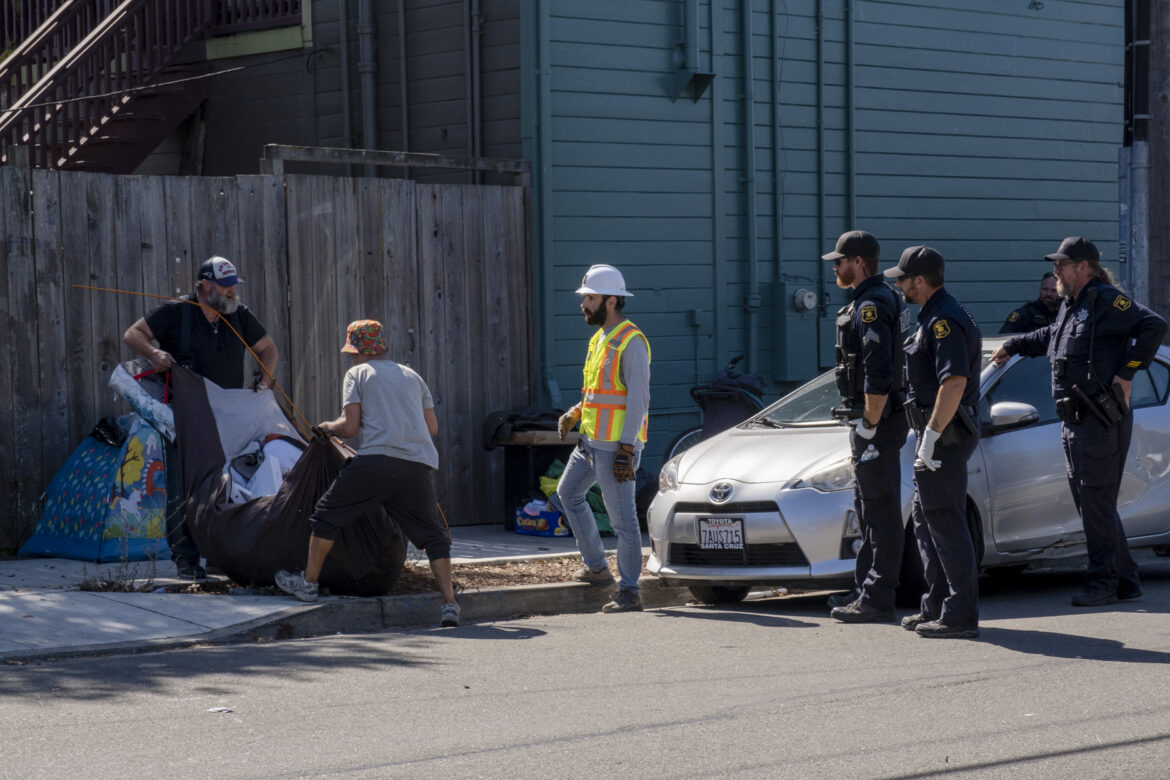
Yesica Prado / San Francisco Public Press
12:54 p.m. Garth runs across the street to pick more items from the pile. Eren watches over his shoulder and suggests what to dig out. Dominique stands in front of the scooper to buy his friends more time to search.
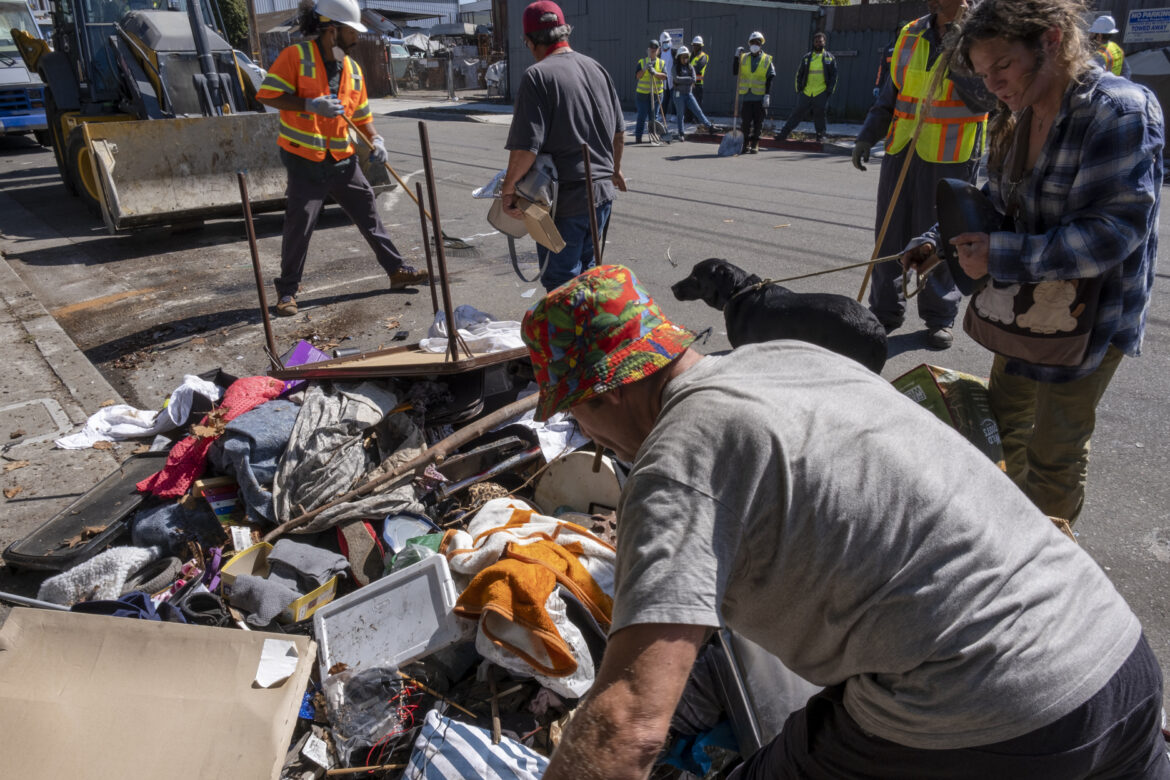
Yesica Prado / San Francisco Public Press
12:57 p.m. Garth is being detained, says one officer, because he has been “delaying and obstructing.” Radu says Garth has to move east of Seventh Street. He has to leave the Harrison Corridor if he wants to save his property, Radu says.
“Can I get two trips to save my stuff?” Garth asks, as he negotiates for a deal. “Take the stuff you want,” Radu says. “I want all my property,” Garth replies.
“If you are going to live in the corridor, you have to live in the tent we provide,” Radu says to Garth.
1:08 p.m. Officer Kleppe makes a deal with Garth: He tells Garth he has to get out of the area and he has one trip to save his property. A member of Berkeley Copwatch helps Garth load up what can fit in her vehicle. She drops him off at the end of the street by the park.
1:11 p.m. Jeff asks for reasonable time to move his stuff out of the area. His wife, Eren, is breaking down in tears inside their tent with her dog. She is unresponsive and shut down from the stress, her mind scattered on what to do next. “My wife is losing it,” Jeff says. “They are just breaking her down more.”
1:18 p.m. Radu talks to Jeff for the first time. He does not know who has been working with them. Housing is based on disability priority, Radu tells Jeff. “We’ll make sure to put some pressure on BACS to meet up with you,” Muhammed says, referring to Bay Area Community Services.
1:28 p.m. Officer Jessica Perry asks whether they should open the street again. Radu sends the cops to lunch.
PART THREE: EVERYTHING GOES
2:20 p.m. Dante is still sitting on the sidewalk with the possessions he could save. “They came to just break a person down and turn me back into a criminal,” Dante says. “When you don’t have anything, you are desperate. And you have to do things you don’t want to do.”
2:30 p.m. City staff and Berkeley Police return from lunch. Two outreach workers and two police officers, Perry and Schickore, help set up the city-issued two-person tents.
2:39 p.m. Alice Barbee is trying to pack up all her things to move back to her spot. She is telling Officer Hartley that she is physically ill and she is afraid to leave to use the restroom without them taking all her stuff.
2:48 p.m. Before people can move their stuff across the street into the new tents, the city starts trashing the property they had saved. Barbee is distraught: “We are human,” she says. “We deserve time to at least move our things.” She deeply exhales and hugs her dog Compass for comfort.
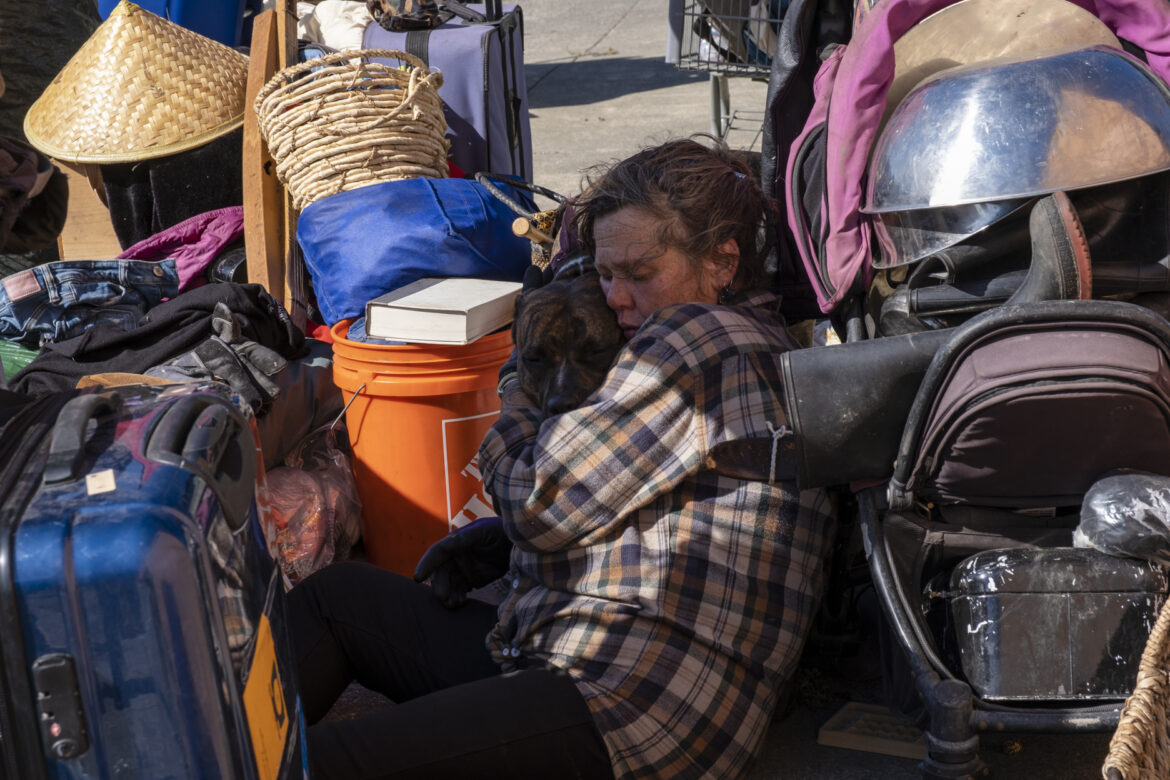
Yesica Prado / San Francisco Public Press
2:50 p.m. City workers begin piling the property residents had saved after being asked to move across the sidewalk for the deep cleaning. Everything is going.
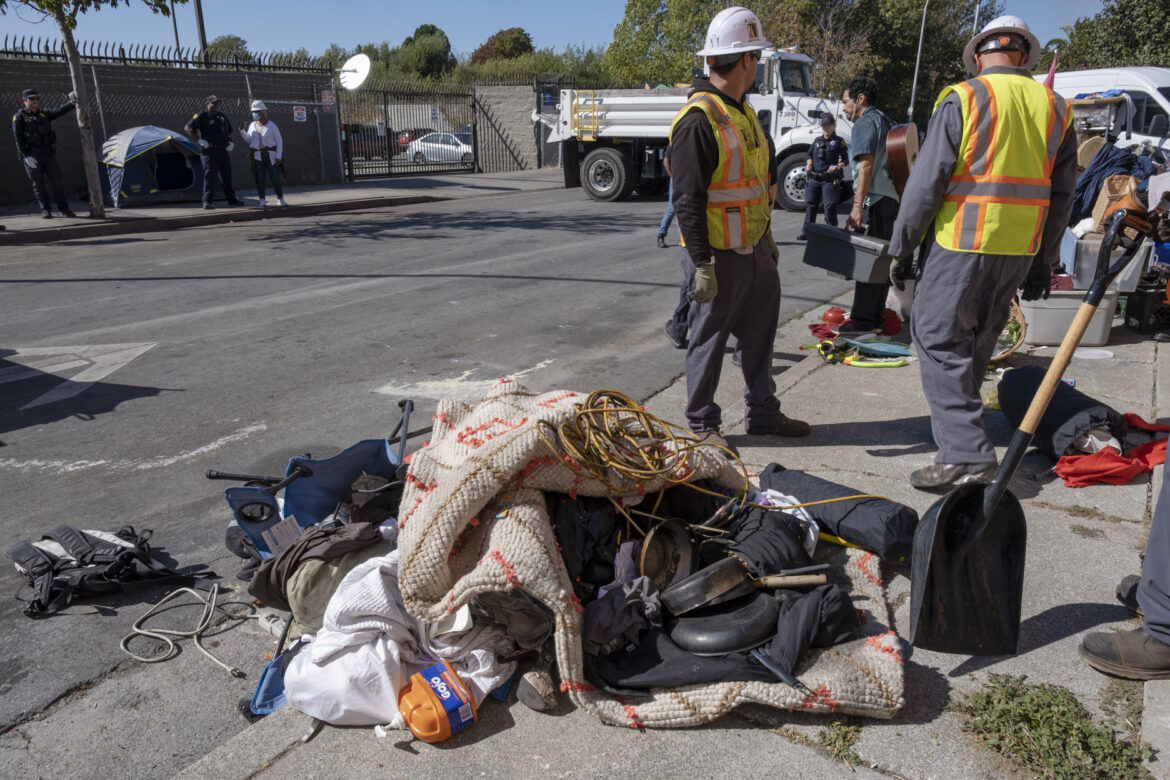
Yesica Prado / San Francisco Public Press
3 p.m. Merced Dominguez comes screaming my name down Eighth Street. “They are taking all your stuff,” she yells. I rush down the street to find out what’s happening.
3:03 p.m. I had been careful to move everything from the sidewalk, but they take everything that was outside of my RV: the cat carrier, scratch post and toys all go. Even the barbecue grill tucked neatly under a tarp behind my vehicle and my trash cans are tossed into the garbage truck. My neighbor demands my trash cans back, and a police officer steps in to ask Radu if this is necessary. Radu dismisses him, and tells him he knows his job. Reluctantly, one worker returns the trash cans without the lids.
3:25 p.m. The fire department comes to check on Eighth Street responding to a request from the police department to provide medical attention to someone who has “an accelerated heart rate and numbness of the face.” They check Alice Barbee’s temperature and heart beat. She is having a hard time breathing. Barbee declines to go to the hospital because she does not want to risk the city taking all her stuff.
3:34 p.m. “What do you want?” Vance asks Mackie as workers start taking his things. His property was not in the street or right of way, but on the sidewalk. She says the notice applies to all sidewalks as well.
3:38 p.m. Mackie had gone to get something to eat and returns to find his and his stepfather Bobo’s belongings in the trash.
3:51 p.m. Mackie tries to save his friend’s property. He ties a rope around the bike cart, securing the items to make the move.
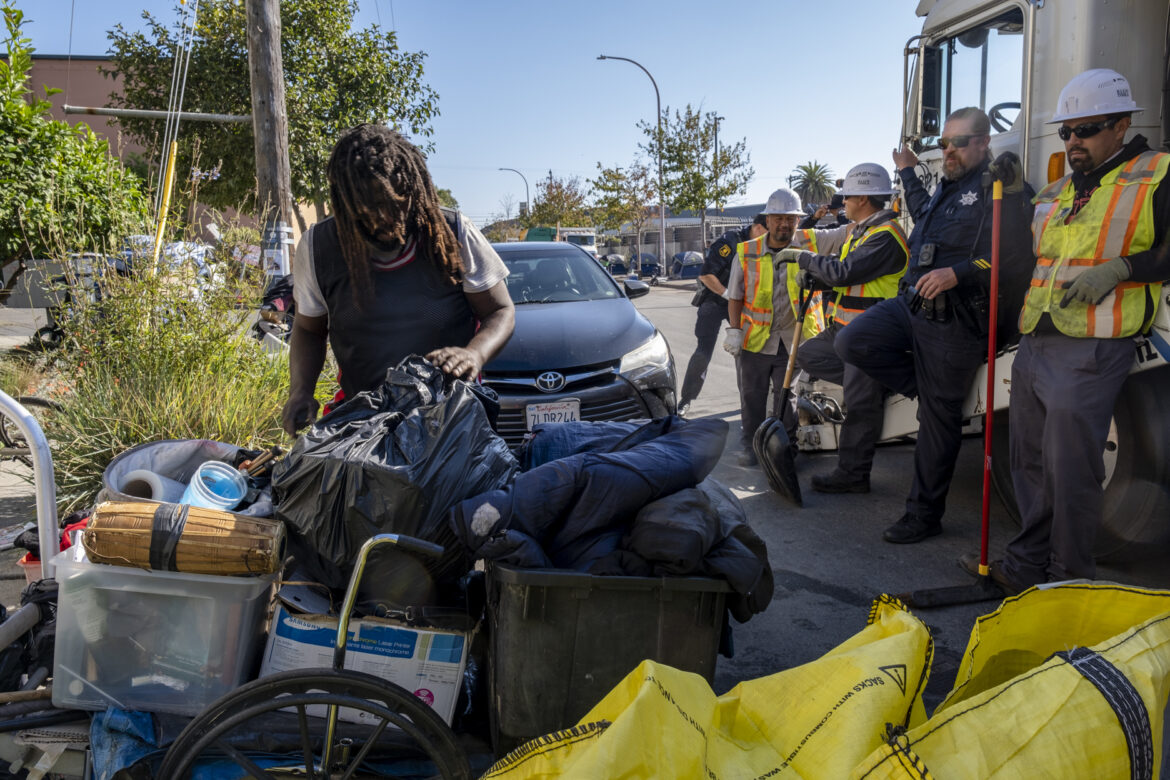
Yesica Prado / San Francisco Public Press
3:58 p.m. Eleven public works employees and four cops surround Mackie while he picks up his friend’s property. Lt. McGee says, “We need you to get rid of stuff that you don’t need. Can you get rid of it? If there’s something you don’t need, toss that shit.” McGee has agreed to save his stuff inside the tent, but only his bedding. He does not want Mackie to take anything else, but Mackie takes his friend’s wagon and recycling.
4:08 p.m. Officer Hartley tells Alice Barbee, “They are thinking about taking you into custody. Your footprint is a large structural house.” Barbee gets frustrated. Officer Perry takes Barbee’s briefcase and pulls it from her. Now, she has to sort through the rest.
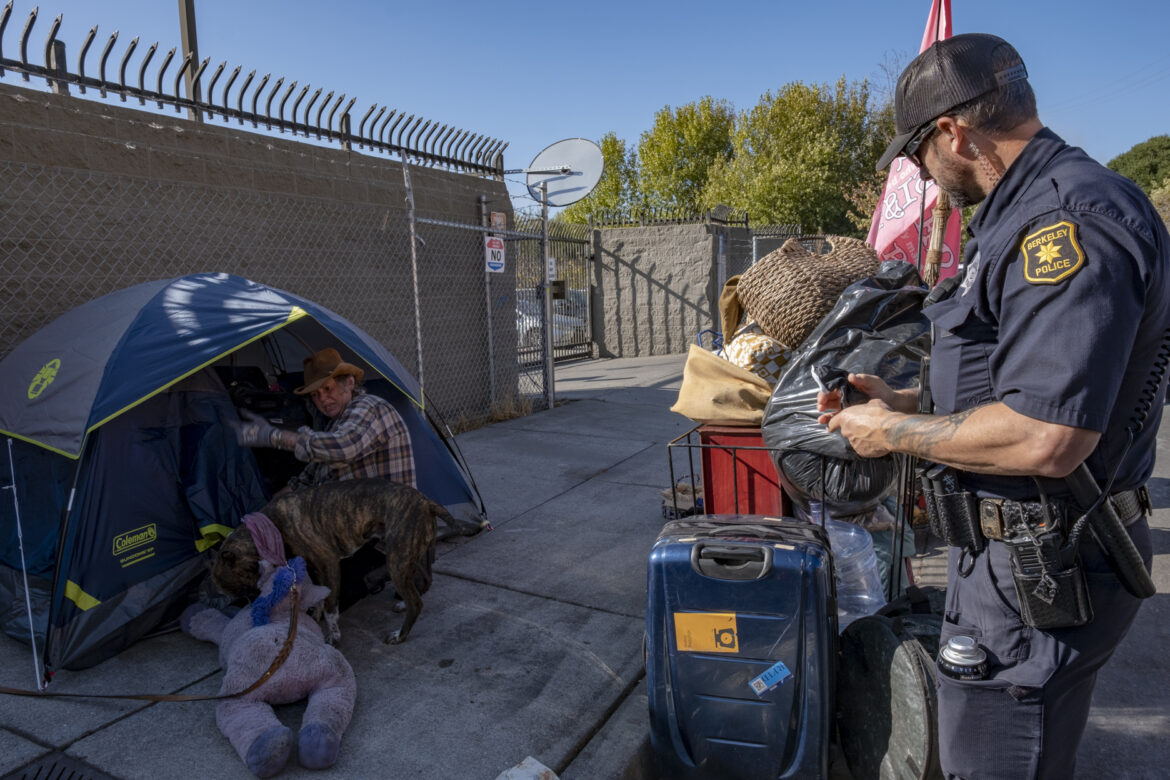
Yesica Prado / San Francisco Public Press
4:12 p.m. Barbee squeezes inside her tent to put away her property. She hunches over sorting the remaining items that she could save. Her pit bull, Compass, lies outside in the concrete. The tent is too small for both of them.
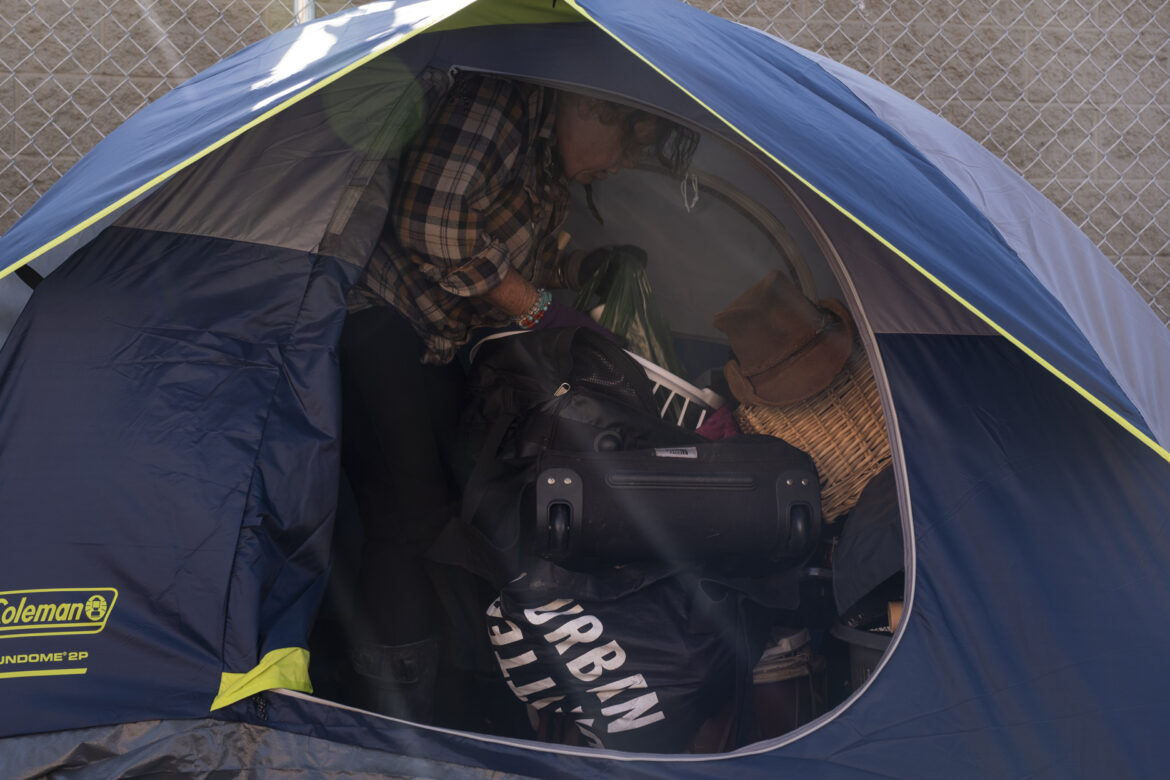
Yesica Prado / San Francisco Public Press
4:14 p.m. The crane scoops up Street’s belongings. His friend Jimmie Wiggins has been watching them this whole time, but they say he can’t keep them, and if he persists, he will be arrested. A large yellow recycling bag, a solar panel, an ice chest, a water jug, a drum, two bike tires, two bags of clothes are all smashed and scooped up by the crane.
I can’t bear to stand by watching. The crane is above my head, and I rush to save the wheelchair. Street moves in his walker, but on bad days, the chair is essential to get him through his day.
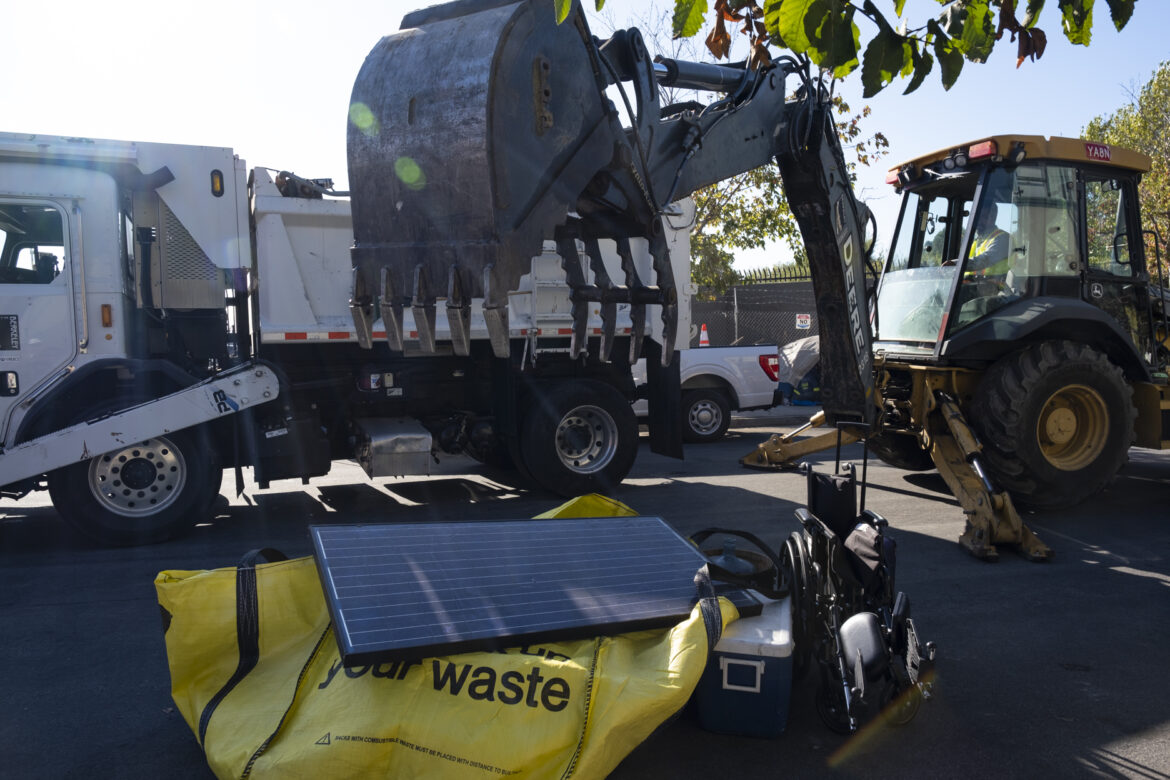
Yesica Prado / San Francisco Public Press
4:20 p.m. On the other side of the street, Public Works employees are going from person to person with Radu, discarding any items that will not fit inside each authorized two-person tent. Bins of clothes, food, hygiene products and water jugs are thrown into the trash.
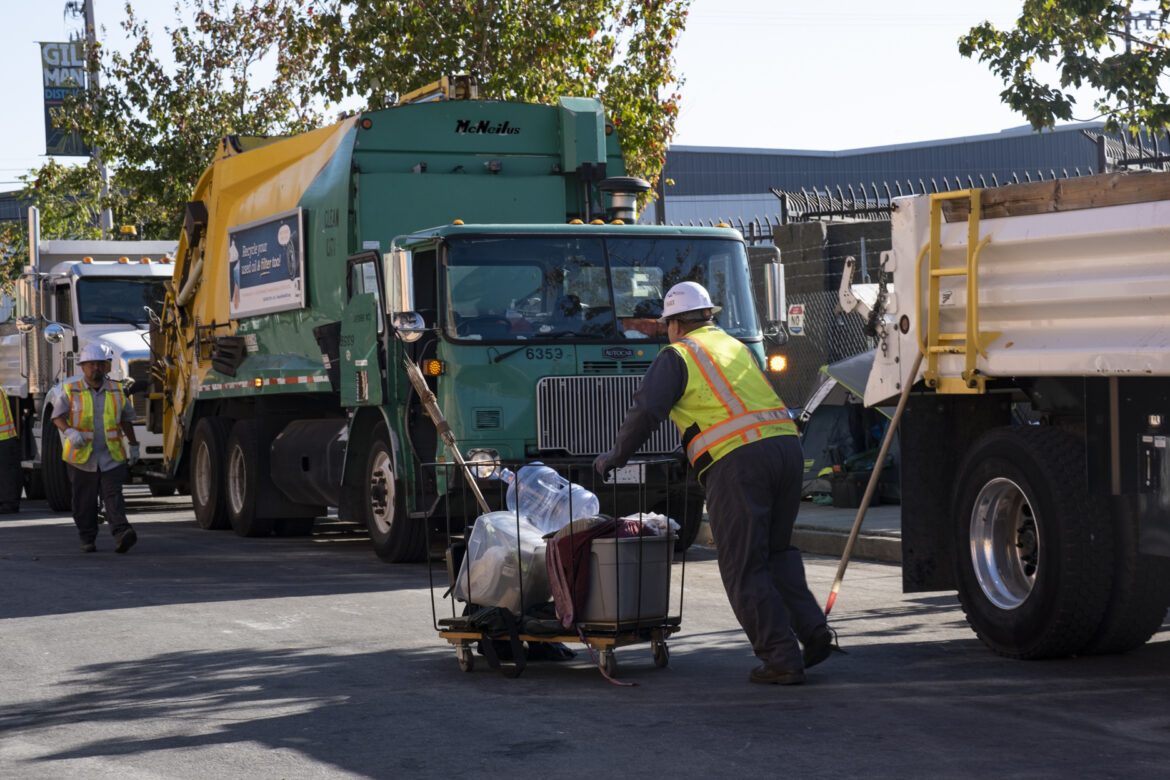
Yesica Prado / San Francisco Public Press
4:22 p.m. Radu sorts through Alice Barbee’s property without her permission. After tossing almost everything, he tells his workers that it is trash. Next, he sorts through the property Barbee has in a wheelbarrow. She had grabbed the wheelbarrow in a rush, tossing anything she could save from her clothes, blankets, dishes, shoes, a purse and a saw. But Radu spends seconds looking at the contents before deciding everything goes.
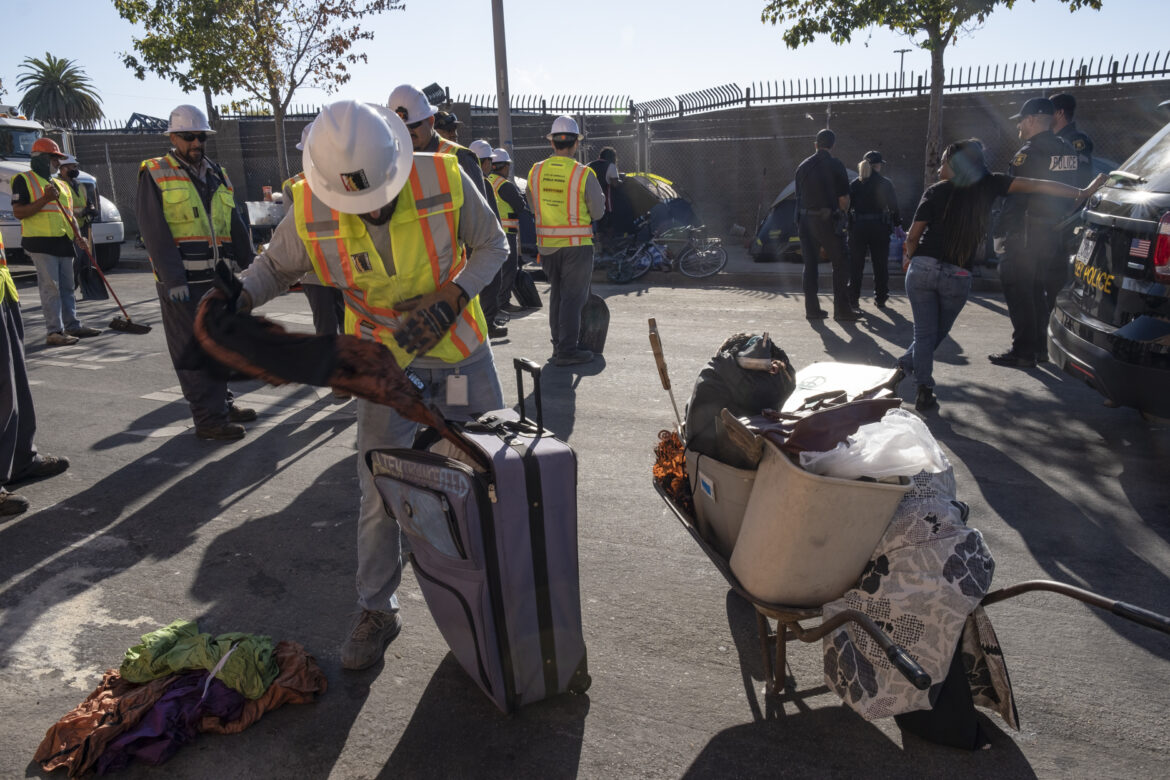
Yesica Prado / San Francisco Public Press
4:27 p.m. Mackie gets arrested for asking for his property back. The quarrel starts when Radu tells Mackie he can’t keep his tent, and Mackie reacts: “I feel like I want to punch you in the face right now,” he says.
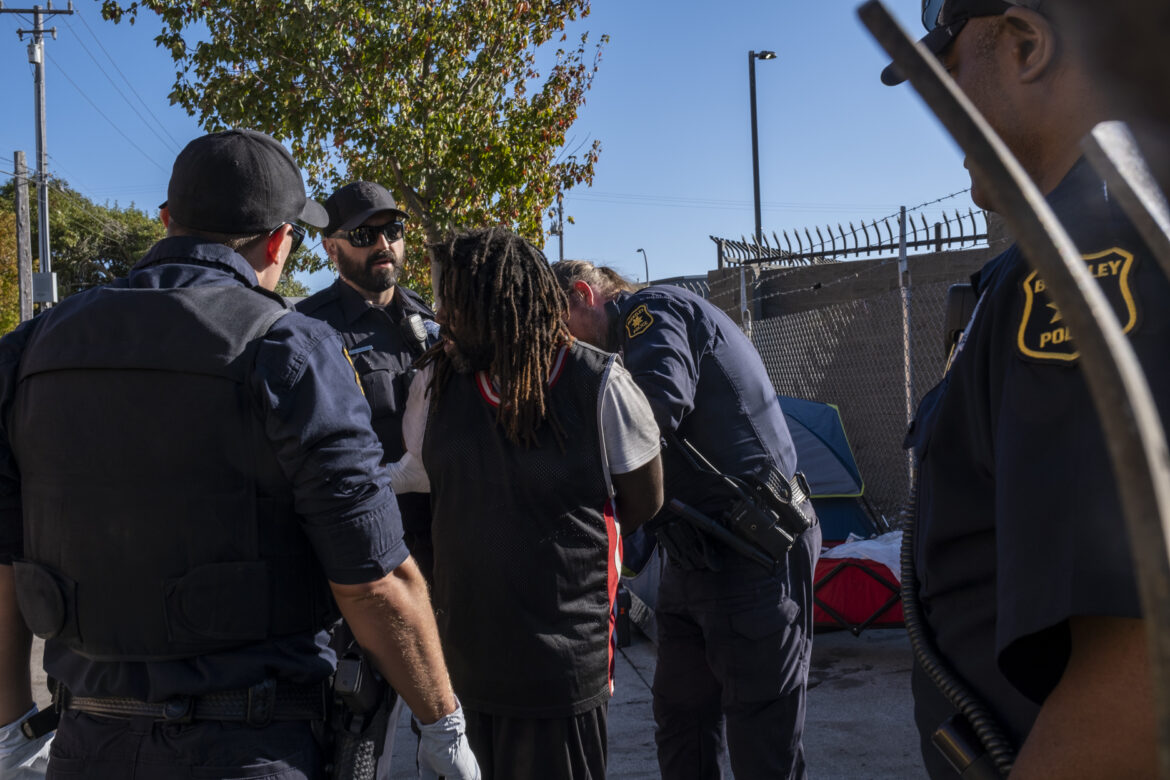
Yesica Prado / San Francisco Public Press
4:28 p.m. Bobo tries to help his son, but is also detained by Berkeley Police. Three officers take hold of him and grasp him tightly. He is not arrested, but not allowed to keep any of his son’s property.
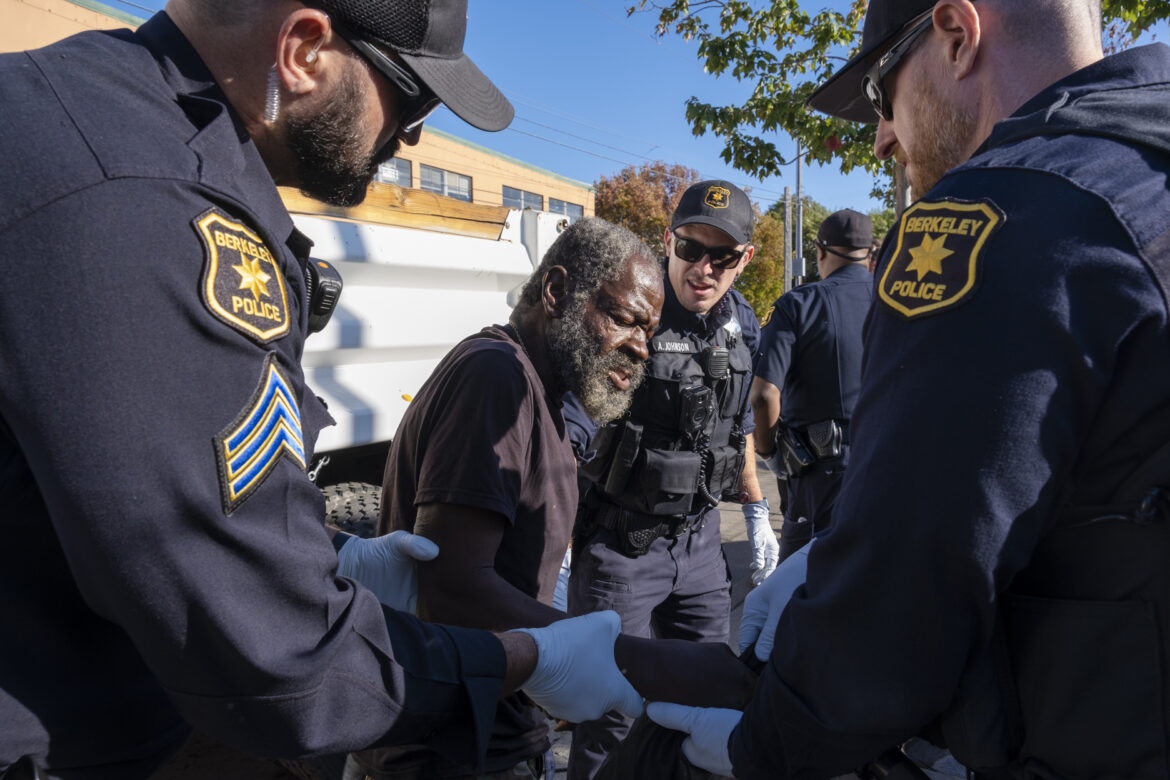
Yesica Prado / San Francisco Public Press
4:37 p.m. Public Works employees start to move in quickly again, taking everything in their path. Even non-bulky items including toilet paper, hand tools and bedding.
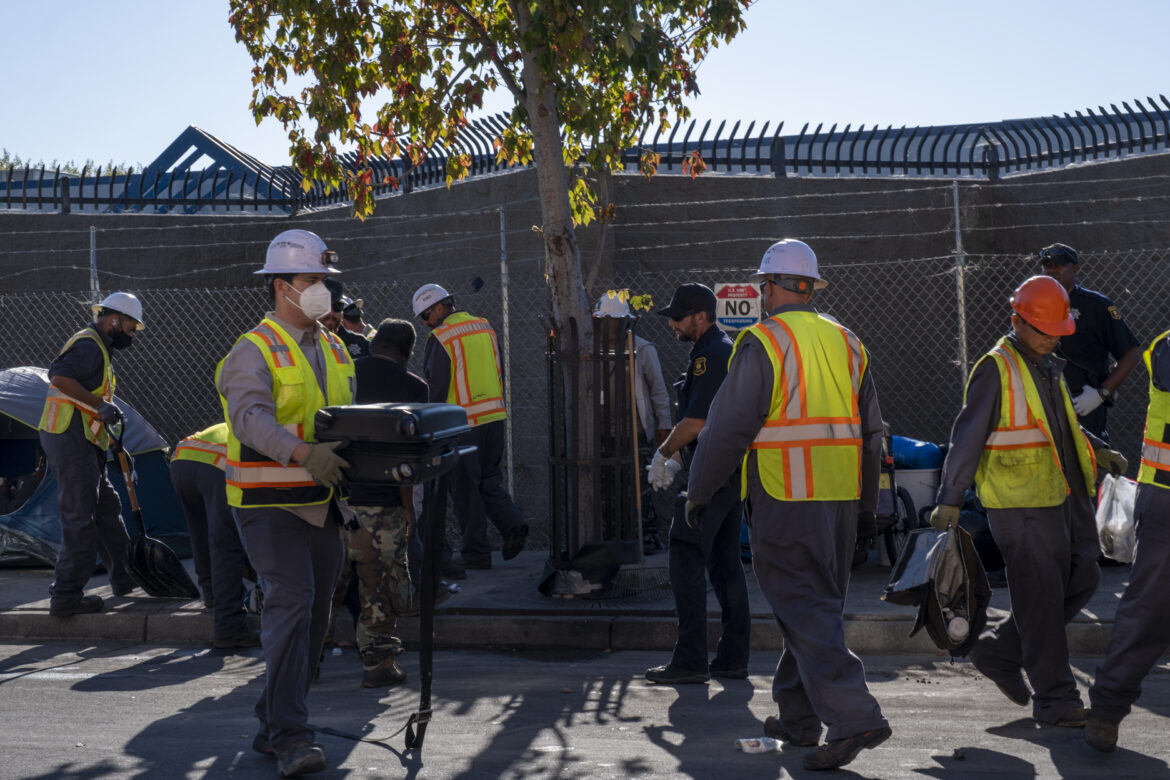
Yesica Prado / San Francisco Public Press
4:39 p.m. Radu empties people’s wagons and bike carts, even though items are off the ground. People do not have the chance to put their items inside the new tents.
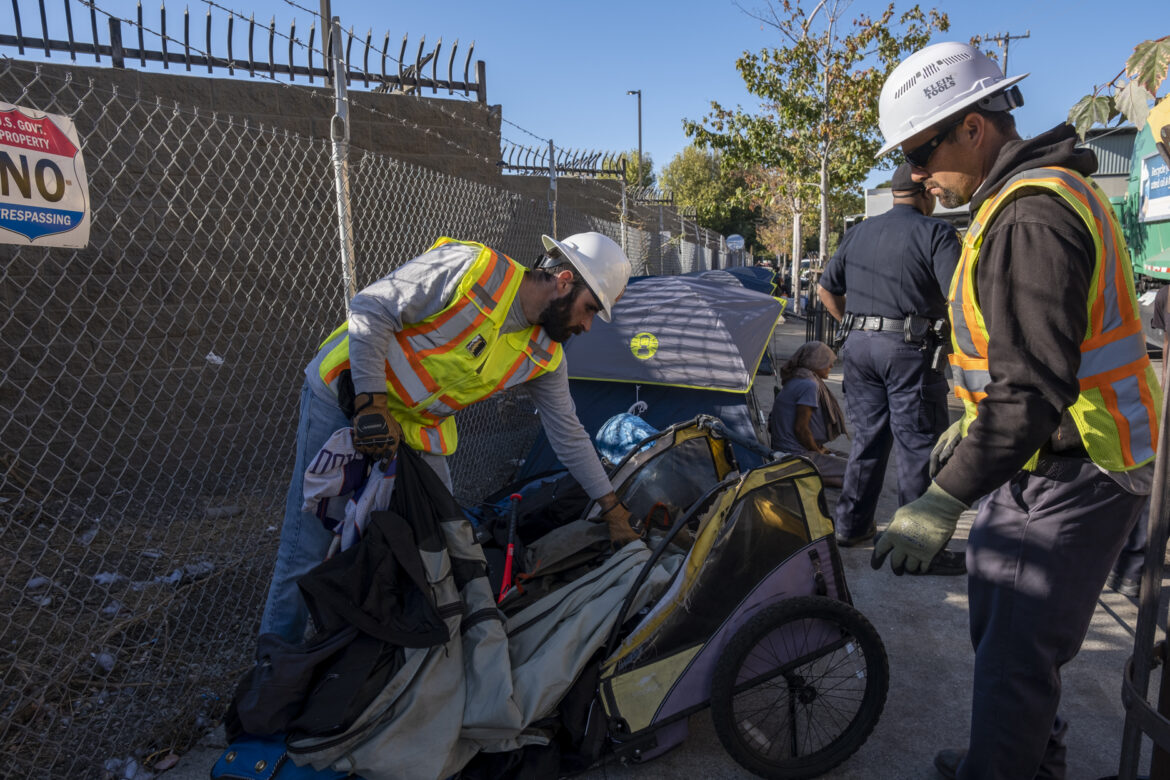
Yesica Prado / San Francisco Public Press
4:39 p.m. From tent to tent, Radu goes down the street sorting through everyone’s items and tossing them to the ground. “All trash,” Radu says. He shuffles through Cat’s notebooks and sketchbooks, and decides to throw it all out.
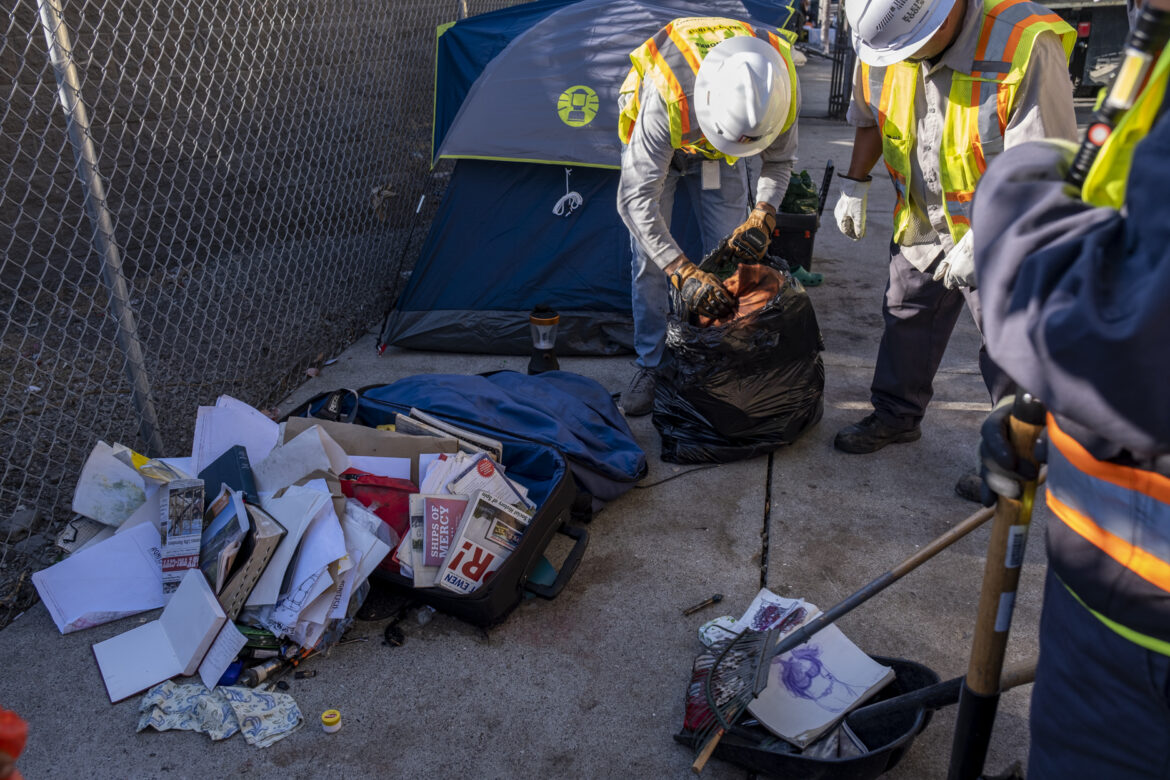
Yesica Prado / San Francisco Public Press
4:45 p.m. One young woman rushes out of her tent to get her property, but Radu throws away her wagon with all her clothes and hygiene items. Two officers, White and Valle, stop her from getting close.
A garbage compactor crushes the wagon. The little property everyone had left was thrown in the trash, including religious items.
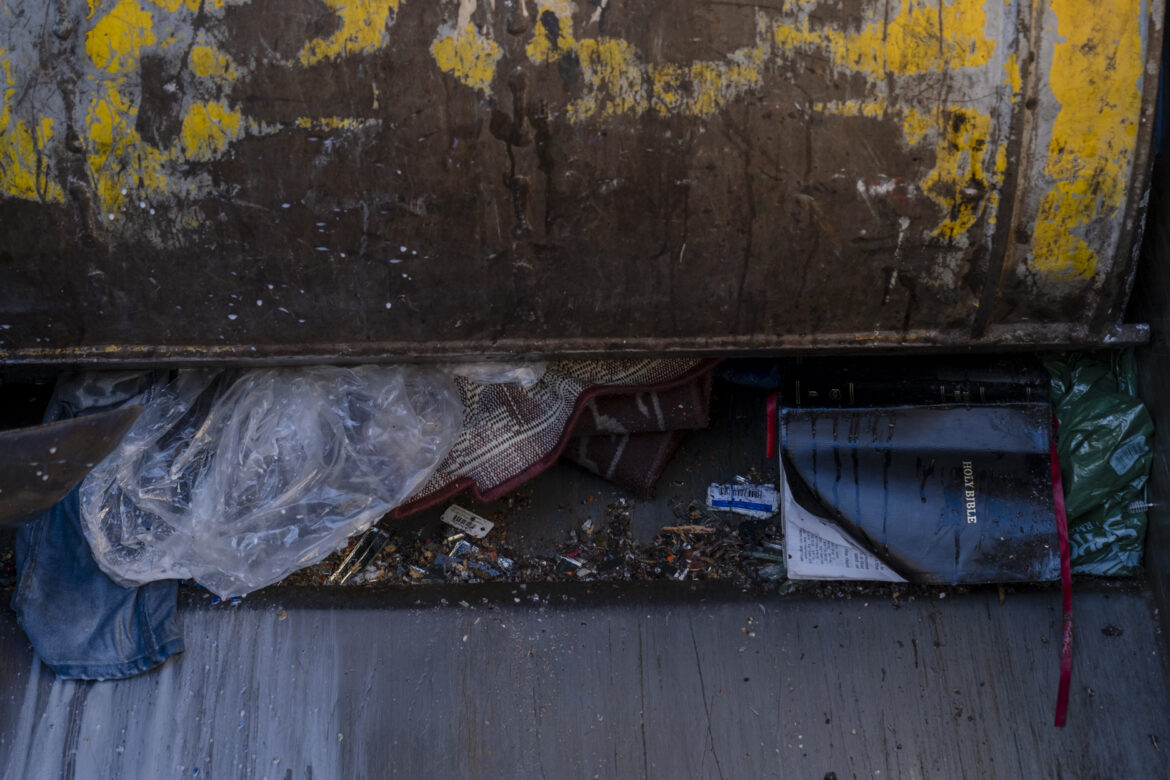
Yesica Prado / San Francisco Public Press
4:48 p.m. The young woman stands in shock. She was given no warning.
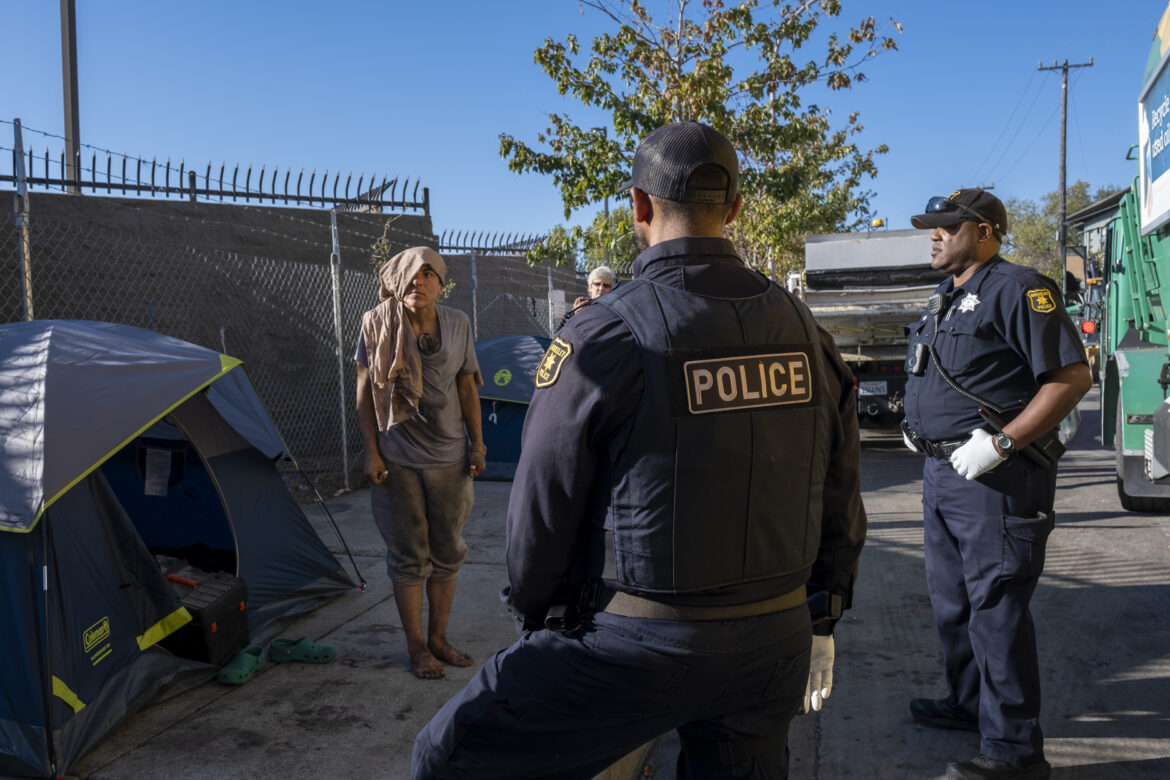
Yesica Prado / San Francisco Public Press
She tries to communicate, but cannot speak. She asks for a pen and paper. Officer White hands them to her. She writes a list of needed essentials that Radu just threw away such as clothes and hygiene products.
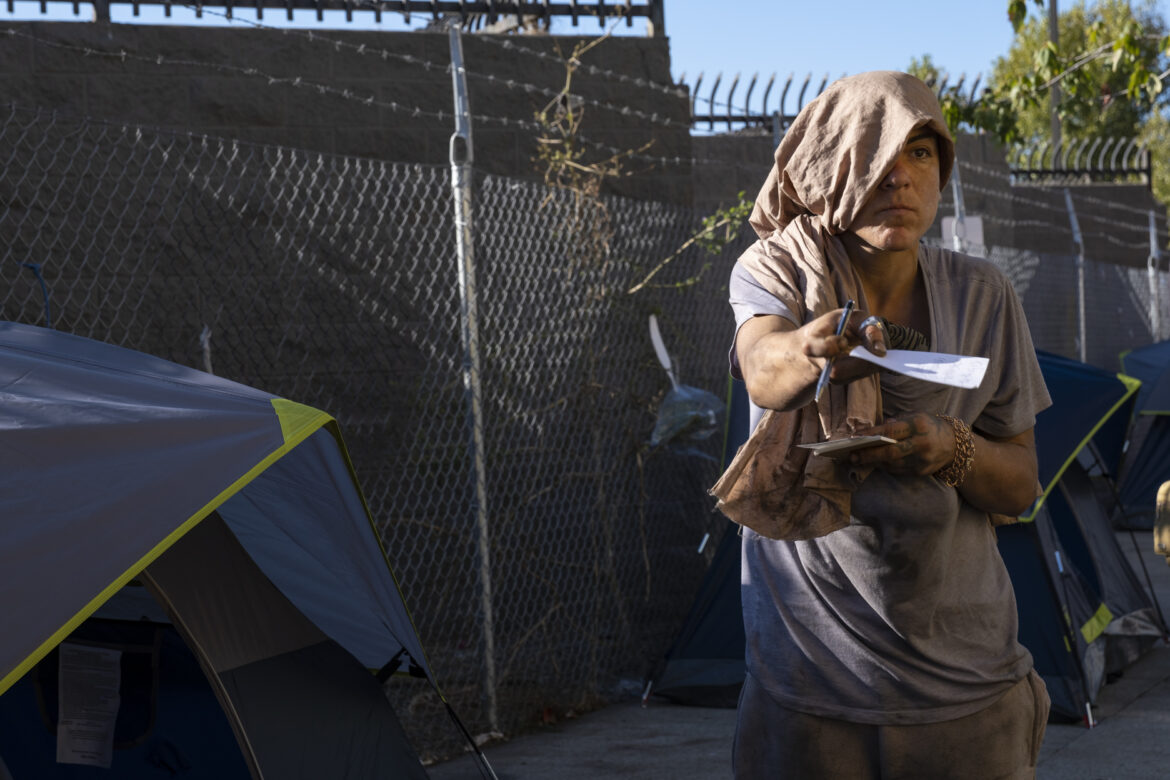
Yesica Prado / San Francisco Public Press
4:52 p.m. Officer White shares her note with Eve Ahmed, the team’s social worker. She reads it and says someone will be here later in the day to hand out supplies. White hands the young woman back her note, and tells her someone will be stopping by to check in later. She lays inside her tent, visibly upset, and doesn’t respond.
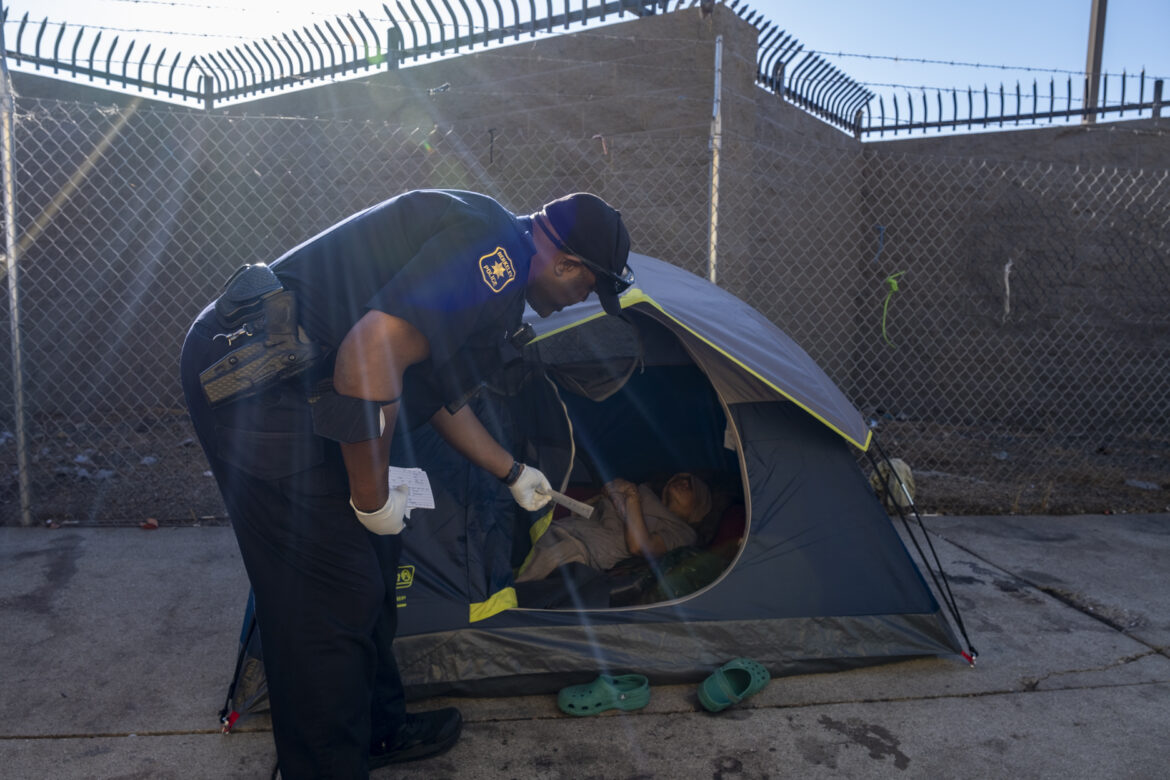
Yesica Prado / San Francisco Public Press
4:50 p.m. City workers are forcing Garcia to get her belongings inside her two-person tent. She is telling them to back off because they are triggering her PTSD.
5 p.m. Workers continue to throw things away. The wheelchair is confiscated, and Radu tells city workers to take it to the yard where Public Works keeps its vehicles.
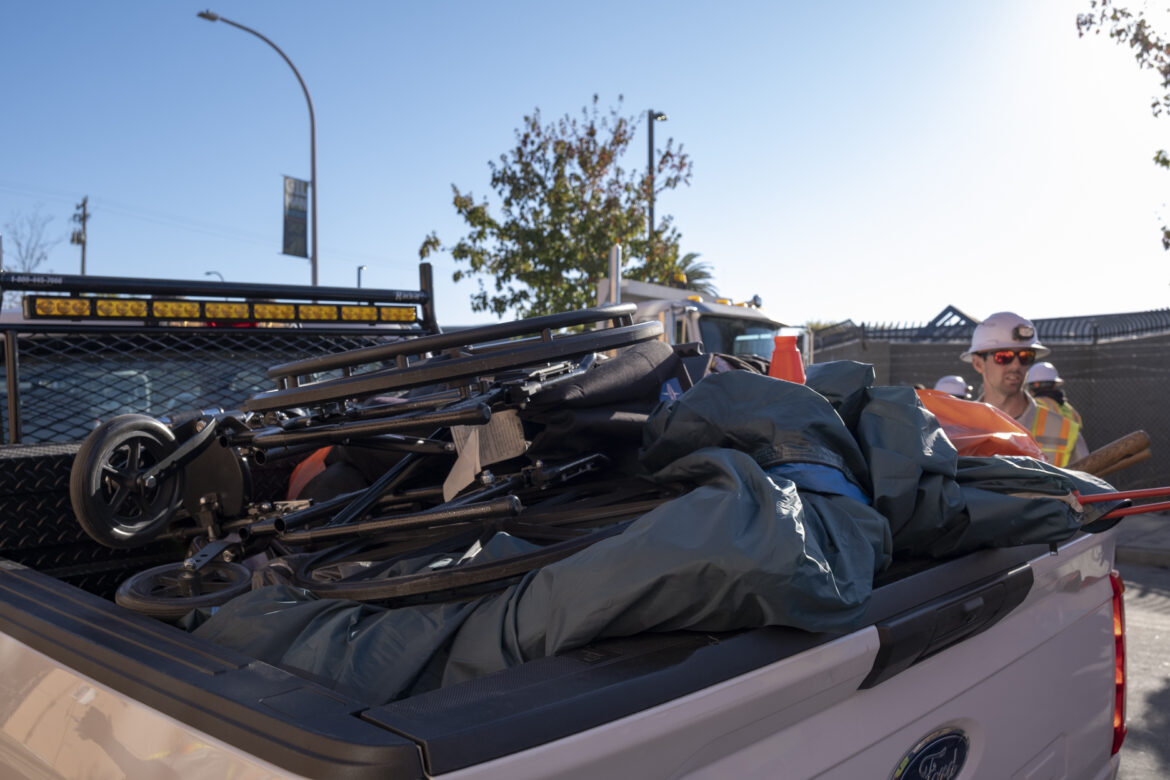
Yesica Prado / San Francisco Public Press
5:12 p.m. Public works employees and cops roll out of Eighth Street. It has been a 12-hour shift for all of us.
PART FOUR: FINAL TALLY
5:16 p.m. Housing Recovery Navigators arrive bringing hygiene kits. They offer cheap slippers, instant noodles, menstrual pads, socks and wet towels for cleaning. None of the items are equivalent in quality, quantity or value to the items that were seized and thrown away. Ahmed sorts through the items and grabs some slippers and a pair of socks to hand to the young woman who was too traumatized to speak.
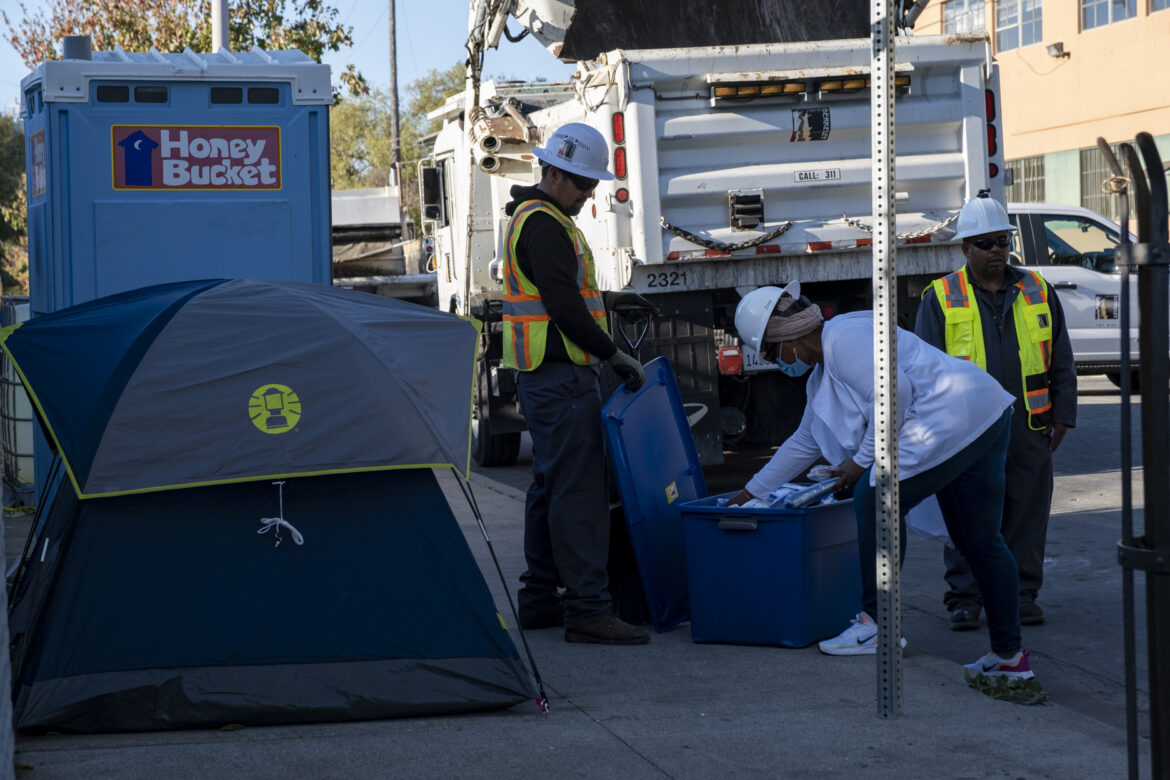
Yesica Prado / San Francisco Public Press
5:23 p.m. Police officers continue to push Shawna Garcia to downsize her footprint. Merced Dominguez helps Garcia consolidate her belongings inside her tent.
5:40 p.m. Before leaving, Eve Ahmed encounters Street, who asks about services. His wheelchair was confiscated, so he is sitting on his walker to rest. But she has no services to offer him, and leaves for the day.
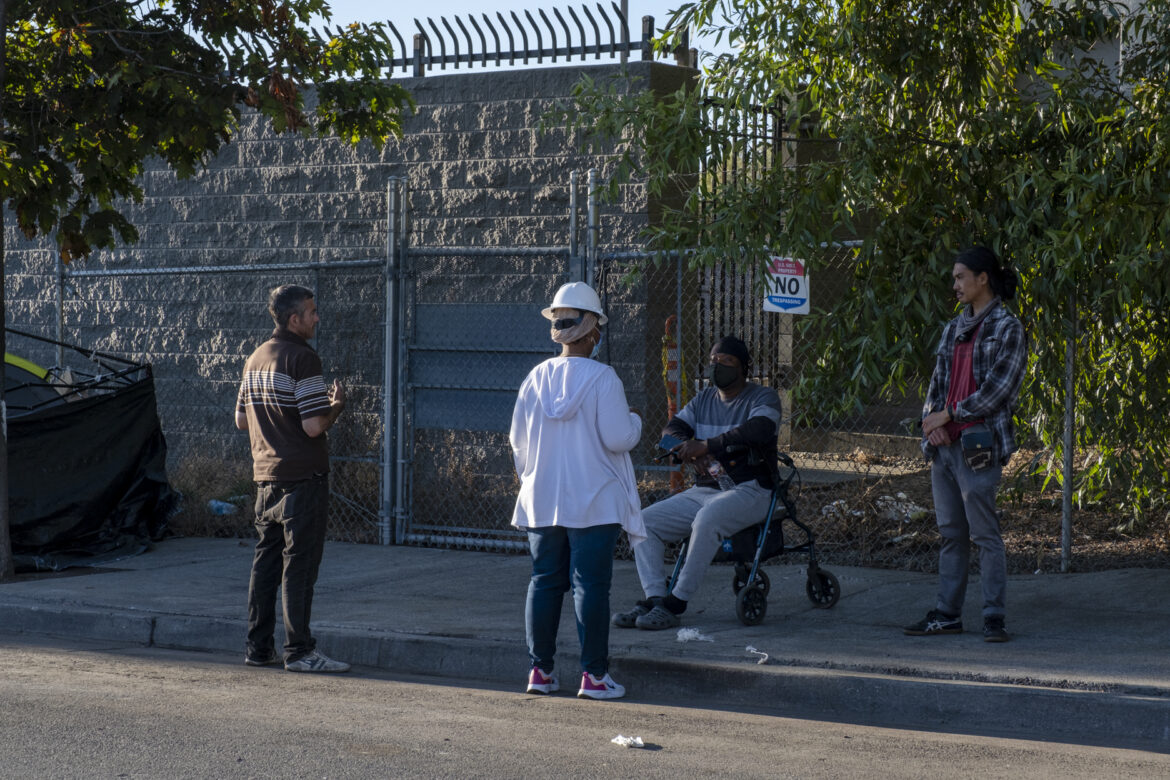
Yesica Prado / San Francisco Public Press
5:46 p.m. Radu walks down Eighth Street, surveying the work done today and snapping pictures for his next report.
6 p.m. Cristina from Housing Recovery Navigators hears feedback from residents as she distributes hygiene supplies. Many ask her, “Why was my medicine thrown away?” “Where is the help?” and “Why can’t I get the tools to remain clean?”
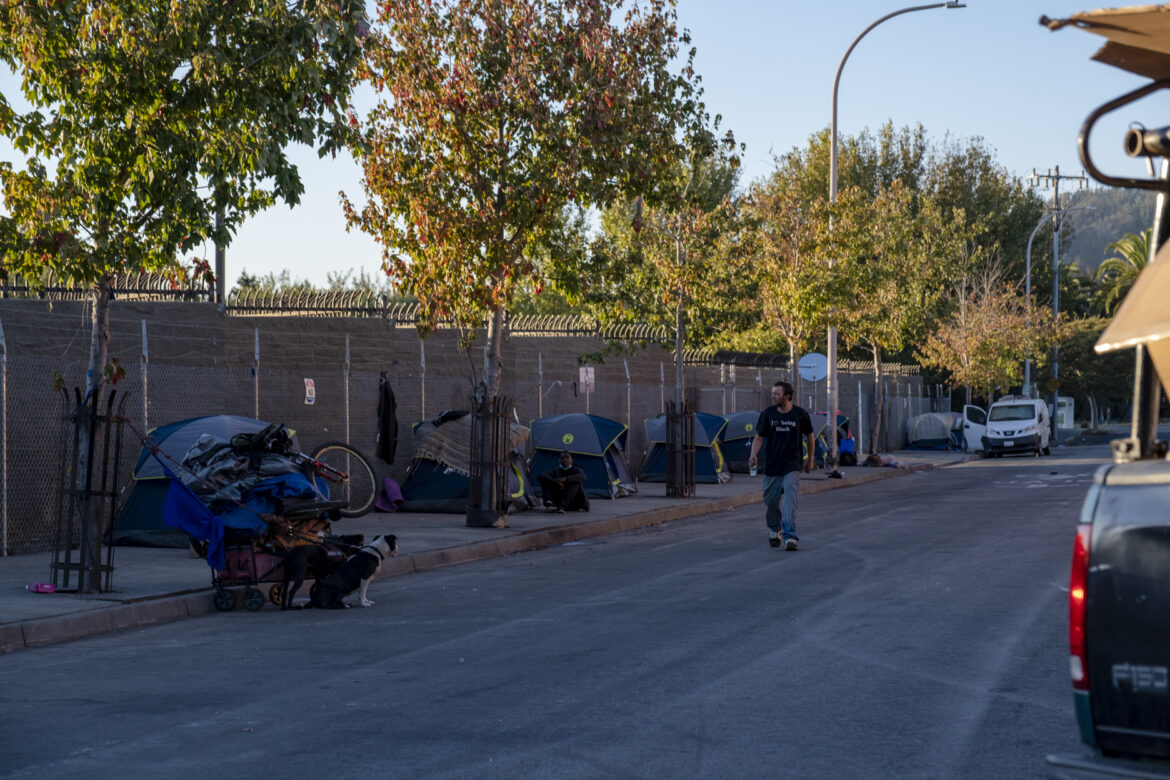
Yesica Prado / San Francisco Public Press
CORRECTION 1/3/2023: Eve Ahmed is an outreach worker for the city of Berkeley. Her last name was incorrect in an earlier version of this story.
